
Dynamics

|
Generational Dynamics |
| Forecasting America's Destiny ... and the World's | |
| HOME WEB LOG COUNTRY WIKI COMMENT FORUM DOWNLOADS ABOUT | |
Imran Khan promises Pakistan a bigger revolution than the Arab Spring
This morning's key headlines from GenerationalDynamics.com.
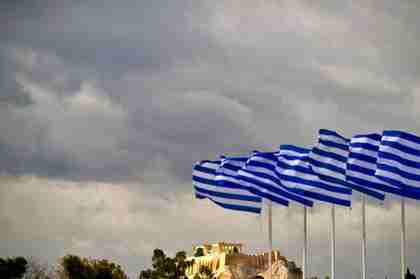 |
An article in Der Spiegel on Monday begins:
"Europe's politicians are losing touch with reality. Greece is broke, and yet Brussels wants to send the country billions in new loans, to which there is growing opposition within the coalition government in Berlin. Rescue efforts are hopelessly bogged down by bickering over who will ultimately step up."
Out of touch with reality? It's been obvious to a lot of people since the whole Greek bailout saga began two years ago that Europe's politicians were out of touch with reality, so one can only roll one's eyes to see it in print in the mainstream media. Though of course I, for one, never really believed that they were out of touch with reality so much as that they were openly lying and defrauding the public.
The article goes on to point out that Greece's economy keeps getting worse, and now they need a €145 billion bailout loan, rather than the measly €130 billion previously expected. Who's going to pay the extra €15 billion? The Germans are refusing, the private investors are balking, and the European Central Bank (ECB) is unwilling to lose even a single euro, which is pissing off a lot of people. EU Economic and Monetary Affairs Commissioner Olli Rehn finally conceded that the €15 billion hole could only be plugged with government funds. The German government, which would supply most of those government funds, is not amused. Spiegel
 |
Probably nothing illustrates the bizarre dysfunction of Europe's politicians than the German proposal to appoint a "budget commissioner" who would have the power to veto Greece's decisions on taxes and spending. This proposal is so absurd that it's been openly rejected by politicians and openly ridiculed by analysts. Here's something from a Greek blogger, Yanis Varoufakis:
"On a final note, I have a message for Germany’s politicians: As a private Greek citizen, I understand your fatigue with all things Greek. But if you are so sure that your blueprint for stabilising Greece is so good (and that the problem is its implementation by the Greek authorities), I would welcome you to come to Athens to take over its implementation. But on one condition:If you succeed in making austerity work in the middle of a debt-deflationary cycle, I am happy for you to name your price. E.g. if within a year or so Greek GDP starts growing again and unemployment diminishes to below 10%, you can have our electricity grid (that Siemens has always coveted), our water companies, any assets that you name in advance. But, if you fail, then you must pay a price: e.g. pay in full Greece’s outstanding loans to the troika.
So, how about it? Are you game?"
However, the German proposal does carry a message for Greece that can't be ignored: If we're going to give you any more money, then, one way or another, we're going to be in control of how you spend that money. Yanis Varoufakis
 |
Panic selling hit Portugal's government bonds on Monday, pushing yields (interest rates) for 10-year bonds to 17.4%. As anyone can see from the adjoining graph, Portugal is following the same path as Greece, though is several months behind. It now costs almost 4 million euros, payable immediately, if you want to purchase credit default swaps (CDSs) to insure 10 million dollars of Portuguese debt. Portuguese Prime Minister Pedro Passos Coelho pinned the blame for Portugal's problems on the EU's failure in sorting out Greece's problems. "The Greek situation continues, after all this time, to be the main factor of instability. It would be very good for everybody in Europe and for Portugal that the situation in Greece is resolved as soon as possible." And so, Dear Reader, if you're behind on your credit card payments, just tell the bank that it's all the fault of Greece. Reuters
Recent reports that Turkey is providing $300 million in aid to Hamas have been dismissed by Turkey's government. Until Monday, an open question was whether Turkey would be willing to become the new host of Hamas leader Khaled Mashaal, now that the genocidal violence by the regime of Syria's president Bashar al-Assad has forced Hamas to split with Iran and Syria, and to move out of Damascus. However, Deputy Prime Minister Bülent Arinç said that Mashaal's being based out of Turkey is out of the question. Mashaal is thought to be considering moving to Jordan or Egypt, though it's not clear that those countries would welcome the controversy of having Hamas headquartered there. Zaman (Istanbul)
 |
Former cricket superstar Imran Khan, now an anti-American Pakistani politician, promised to bring the people of Pakistan together under his leadership, when he "captains the nation":
"My tsunami is much bigger than the leaderless Arab Spring, which was triggered by social media, but in Pakistan the media is free and I am leading the ‘revolution' from the front.We will immediately announce a ceasefire and will not use our military against our own people because I have always said that it is not our war and we should not fight it. The US should also exit from Afghanistan to ensure peace in the region."
In his interview in Dubai on Sunday, he reiterated that he would sweep the next general elections, eradicate corruption within 90 days and bring reforms in all fields. After that, he said, "This is the moment when the rise of the oceans began to slow and our planet began to heal." Oh wait, that was someone else. Gulf News (UAE)
(Comments: For reader comments, questions and discussion,
see the 31-Jan-12 World View -- Analysts ridicule Germany's plan to control Greece's budget
thread of the Generational Dynamics forum. Comments may be
posted anonymously.)
(31-Jan-2012)
Permanent Link
Receive daily World View columns by e-mail
Donate to Generational Dynamics via PayPal
American embassy in Cairo shelters U.S. citizens threatened with arrest
This morning's key headlines from GenerationalDynamics.com.
 |
Greece reacted strongly over the weekend to a leaked German proposal for a European budget commissioner to oversee the country’s fiscal policy. Greece's Finance Minister Evangelos Venizelos Sunday dismissed the idea, saying:
"Whoever puts before a people the dilemma of choosing between financial assistance and national dignity disregards basic historical lessons."
I assume that he was referring to historical lessons related to World War II and Nazi Germany. Despite the backlash in Athens, the plan received open backing from German Economy Minister, and vice chancellor, Philipp Roesler:
"We need more leadership and monitoring in implementing the course of reform (in Greece). If the Greeks fail to do this themselves, the leadership and monitoring must come in a stronger way from outside, for example through the EU."
Despite the increasingly vitriolic debate, France's president Nicolas Sarkozy in a Sunday TV interview said that the measures taken to end Europe's financial crisis were taking effect:
"Europe is no longer on the edge of the abyss. The elements of a stabilization of the financial situation in the world and in Europe are in place."
In response to this, a member posted in the Generational Dynamics forum the following from a speech given by President Herbert Hoover, at the annual dinner of the Chamber of Commerce of the United States on May 1, 1930:
"While the crash only took place six months ago, I am convinced we have now passed the worst and with continued unity of effort we shall rapidly recover. There is one certainty of the future of a people of the resources, intelligence and character of the people of the United States -- that is, prosperity."
Sarkozy is facing likely defeat in an approaching Presidential election, but he received good news on Sunday: German Chancellor Angela Merkel will join Sarkozy at campaign rallies in coming weeks to boost his reelection chances.
Kathimerini and Agence France-Presse (AFP)
In what appears to be a dramatic worsening in Washington's relationship with Egypt, the American embassy in Cario on Sunday took the highly unusual step of sheltering "a handful" of U.S. citizens employed by pro-democracy nongovernmental organizations (NGOs) who have been prevented from leaving Egypt, and may be threatened with arrest. This situation has become international news because one of the people prevented from leaving is Sam LaHood, the son of US Transportation Secretary Ray LaHood. It's not known whether LaHood is among those staying in the embassy. Washington Post
Afghanistan's President Hamid Karzai, in conjunction with the government of Pakistan, is planning to meet with Taliban representatives in Saudi Arabia to discuss a peace process. Karzai has been angered by a peace process with the Taliban initiated by the U.S., with meetings in Qatar, and has launched what is evidently a competing peace process, with different Taliban representatives. It's not known whether the two sets of Taliban representatives approve of each others peace process. BBC and AFP
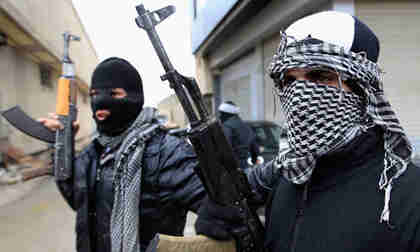 |
Syria launched a major military offensive to seize back parts of Damascus controlled by the Free Syrian Army, defectors from the regime of president Bashar al-Assad. Government forces killed at least 19 people in some of the bloodiest fighting in the capital since Syria's 10-month uprising began. Witnesses inside Damascus described scenes of mayhem, with troops shelling residential areas and fierce house-to-house fighting. With the suspension of the Arab League observer mission, which al-Assad was using as a cover for more violence, the regime is re-imposing the media blackout that was lifted slightly with the Arab League mission. "With no Arab observers and not much media presence left things could now get a lot worse," said a western diplomat. "Any constraining hand has gone. It makes it all the more urgent to achieve something at the UN this week and that can't be taken for granted." Guardian
February 2 marks the 30th anniversary of the massacre in Hama, Syria, perpetrated by the regime of Hafez al-Assad, the father of the current president, killing some 40,000 people. A young conscript took part in the genocide and now, 52 years old, he told his story to a BBC interviewer (my transcription):
"They told us the people of Hama they all of them are terrorists and criminals, and we have to kill them all. We have to clean the city from them. That's what we heard them say. They have the weapons, and [we had to] to kill the people everywhere. So we have to defend [ourselves].Nobody had a weapon. We saw people in the street protest -- they had nothing -- kids, women, you know. And then we started shooting people everywhere, we started going house by house, and we take people from the houses, and we put them on the wall without even asking him what's your name, what's your id, what's your job, what are you doing here?
That's what happened. We stayed three years doing that, and we killed people everywhere. You see their bodies everywhere. You see them smell bad. Because the bodies stay there a couple of days, nobody picks them up.
We don't ask what's your name, we don't ask what your id. It just doesn't matter, Sunni, Shia, Alawite, girls, boys, old, young, we kill everyone, everybody.
Sometimes we kill the kids like 6, 7, 3 years old by the tank, because we attack the houses and the buildings, and people living inside, and of course every house has kids and children. We kill them all. We bury too many thousand people live, we bury them with the dead people.
I will never forget anything. Everything that I spoke to you now, I have in front of my eyes. I remember everything. I remember all the blood, in Hama. ...
We kill people handicapped, sick in their bed, we go inside their houses. We see people sick, they have medication, they have oxygen, some people they don't see, they don't hear, they're half blind. We kill them. We go street by street, street by street. We go inside the houses, house by house, we take these people, we collect these people, and move to the end of the street, and we kill them.
Sometimes you collect four hundred people, sometimes 200, sometimes 600. I swear on my kids - until now, I sometimes wake up, I talk to myself, I cry. I have dreams, bad dreams, you know. Because I remember everything. What I see, it's too much. We buried live people, live innocent people. We killed girls, women, pregnant women, they killed the pregnant woman by the knife, they killed them sometimes in the neck like you kill a lamb or a goat. I swear, believe me.
I speak out now because now maybe somebody listen to this what I'm saying. I say you know what. We have to do action. We can't just keep our mouths shut, when we hear what's happening in Hama.
We have to bring this evil to justice."
BBC World Service Newshour (at 47:00)
Without any major announcement, Khaled Meshal, the leader of the Palestinian Islamist movement Hamas, has effectively abandoned his longtime base in Damascus, Syria. According to a Hamas leader in Gaza, "The situation there does not allow the leadership to be present. There are no more Hamas leaders in Damascus." Meshaal has been embarrassed by Bashar al-Assad's violent crackdown, with more than 5,000 people reported killed. Many victims of the regime forces have been Sunni Muslims allied to the Muslim Brotherhood, whose support Meshaal relies on. The Syrian uprising has also caused a major rift between Hamas and Iran. Day Press News
(Comments: For reader comments, questions and discussion,
see the 30-Jan-12 World View -- Germany openly backs plan to give EU control of Greece's budget
thread of the Generational Dynamics forum. Comments may be
posted anonymously.)
(30-Jan-2012)
Permanent Link
Receive daily World View columns by e-mail
Donate to Generational Dynamics via PayPal
Egypt detains son of US Transportation Secretary Ray LaHood
This morning's key headlines from GenerationalDynamics.com.
 |
The African Union has inaugurated a new headquarters with tributes to China's rise in Africa. The new $200 million Chinese-built headquarters was officially opened by China's senior political adviser Jia Qinglin, standing in for Premier Hu Jintao. In a speech to an audience of heads of state and African diplomats in the spectacular 2500-seat Grand Hall, Jia hailed the rapid growth of China-Africa relations. China's trade with African countries reached $150 billion last year, he said, a 13 fold increase in the past decade. Others at the ceremony praised China as the model for Africa's economic growth. VOA
A confrontation between the U.S. and Egypt is growing over the arrest last week of Sam LaHood, the son of US Transportation Secretary Ray LaHood, in a raid by the Egyptian regime on non-governmental organizations (NGOs) working for democracy in Egypt. Several other Americans have been detained as well, on charges of working for an unregistered NGO, and they may be jailed for five years. The ruling Supreme Council of the Armed Forces (SCAF) is blaming the recent unrest in Egypt on "foreign hands," and has accused local NGOs of receiving money from abroad. Bikya Masr (Cairo)
The Arab League has frozen its monitoring mission to Syria because of increasing violence, a lot of it taking place right under the noses of the Arab League observers. The decision to freeze the mission comes in the midst of a broad regime offensive that's killed about 100 people in the past few days, many in their own homes. Arab League Secretary-General Nabil Elaraby:
"Given the critical deterioration of the situation in Syria and the continued use of violence ... it has been decided to immediately stop the work of the Arab League's mission to Syria pending presentation of the issue to the league's council."
Syria accused the Arab League of ending the mission in order to pressure the U.N. Security Council:
"Syria regrets and is surprised at the Arab decision to stop the work of its monitoring mission. This will have a negative impact and put pressure on (Security Council) deliberations with the aim of calling for foreign intervention and encouraging armed groups to increase violence.
However, an analyst says, "There has been a dramatic escalation in violence in Syria and, I believe that the termination of the mission of the Arab League observers in Syria indicates that the Syrian Army is about to launch a major offensive. The regime is about to do something dramatic." VOA and Reuters
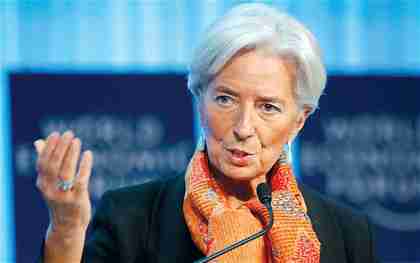 |
As the days go by and the eurozone debate over the coming default on Greece debt grows more vitriolic, a new proposal has emerged that's infuriated the Greek public. International Monetary Fund (IMF) managing director Christine Lagarde said that a "fiscal compact" is set to be signed on Monday by eurozone officials, and a leaked document reveals a German proposal to force Greece to accept an external "budget commissioner" who would have the power to veto government decisions on budget, taxes and spending if they were not in line with committed targets. Reaction from the Greek government was furious. The education minister, Anna Diamantopoulou, a former EU commissioner, slammed the idea as "the product of a sick imagination." The proposal freaked out other people as well, since it would obviously also apply to Ireland, Portugal, and other indebted countries. However, the German proposal points out:
"Given the disappointing compliance so far, Greece has to accept shifting budgetary sovereignty to the European level for a certain period of time."
London Telegraph and Al-Jazeera
Following are security developments in Pakistan on Saturday:
Nothing special. Just another ordinary day in the life of Pakistan. Reuters
(Comments: For reader comments, questions and discussion,
see the 29-Jan-12 World View -- German proposal for EU control over Greece's budget causes fury
thread of the Generational Dynamics forum. Comments may be
posted anonymously.)
(29-Jan-2012)
Permanent Link
Receive daily World View columns by e-mail
Donate to Generational Dynamics via PayPal
Spain's unemployment rises to 22.9%, a 15 year high
This morning's key headlines from GenerationalDynamics.com.
 |
China's security forces fired into a crowd of protesters in China's southwestern Sichuan province, killing one man and wounding three others, according to a Tibetan rights group, the third such incident this week. Witnesses say security forces killed at least six protesters Monday and Tuesday in separate incidents in Sichuan, which is home to many ethnic Tibetans. They said at least 60 people were injured. The protests have been spurred by activits who were posting leaflets declaring self-immolations by Buddhist monks and others would not stop until Tibet is free. VOA
Gunmen suspected of being members of the terror group Boko Haram attacked a police station in Kano, Nigeria's second largest city on Friday, police and witnesses said, leading to more than an hour of running gun battles. This comes one week after a series of coordinated gun and bomb attacks, mostly on police stations, killed 186 people in Kano. Boko Haram's purported leader, Abu Bakar Shekau, said in an audio message: "We're killing police officers, we're killing soldiers and other government people who are fighting Allah; and Christians who are killing Muslims and talking badly about our Islamic religion." Nigerian President Goodluck Jonathan is offering to negotiate with Boko Haram, apparently after concluding that the terror group cannot be stopped by force. Poverty is increasing in Nigeria's north, and poverty has fed Boko Haram's ranks. It is no longer a sect of Islamic fanatics but has the support of disgruntled politicians and their paid thugs. One source says young men are being paid as little as $2 a day to take part in the group's attacks. Reuters and CNN
The Nigerian government's war on Boko Haram may not be stopping Boko Haram, but it's disrupting the supply lines of al-Qaeda in the Islamic Mahgreb (AQIM - Northern Africa). As a result, AQIM is forced to use Boko Haram as a rear base and supply source for weapons and young recruits. This comes as there are a growing number of proven links between BH and AQIM, especially when the deteriorating situation in Libya in 2011 caused an exceptional increase in the flow of arms and explosives in the region. Boko Haram members from Nigeria and Chad had received training in al-Qaeda in the Islamic Maghreb camps in Mali during the summer of 2011. Magharebia (Magharebia, a news web site covering the Maghreb region (northern Africa), is sponsored by the United States Africa Command)
 |
Morocco, the only Arab member of the U.N. Security Council, on Friday submitted the Arab League's draft resolution aimed at ending the violence in Syria. Russia's Ambassador Vitaly Churkin said that the text has "red lines" for Moscow, but he's willing to "engage" with the resolution's sponsors. Churkin said those lines include any indication of sanctions, including an arms embargo. "We need to concentrate on establishing political dialogue," he said. However, the British ambassador pointed out that the text contains no mention of an arms embargo and other sanctions, suggesting the Russia was looking for an excuse to reject any resolution aimed at its ally, president Bashar al-Assad of Syria. Russia claims that NATO misused last year's Security Council's resolutions on Libya as a pretext for regime change in that nation. AP
I wrote two days ago that around the world, anxious and frightened people are turning to religion for comfort in this generational crisis era. A survey shows that this is true for Israeli Jews. Fully 80 percent of Israeli Jews believe that God exists - a record high. The survey also found that 70 percent of respondents believe the Jews are the "Chosen People," 65 percent believe the Torah and mitzvot (religious commandments) are God-given, and 56 percent believe in life after death. It found that only 46 percent of Israeli Jews now define themselves as secular, down from 52 percent in 1999, while 22 percent define themselves as either Orthodox or ultra-Orthodox, up from 16 percent in 1999. The remaining 32 percent term themselves traditional, virtually unchanged from 1999. Haaretz
Twenty years after the Philippines ejected huge American naval and air bases, both countries are responding to the growing threat from China in the South China Sea with a proposal to deploy surveillance aircraft in the Philippines. This follows a recent announcement of plans to set up a Marine base in northern Australia, and possibly to station warships in Singapore. These moves are part of the Obama administration's "pivot" to Asia. However, there are no plans for any new U.S. bases in the Philippines. Reuters
Spain’s unemployment rate in the fourth quarter rose to 22.9%, the highest in 15 years, from 21.5% in the previous three months. Prime Minister Mariano Rajoy took office after a November 20 election in which he promised policies to increase jobs. At the same time, the country's huge public debt requires additional austerity measures to prevent bankruptcy. The fact that these two objectives are completely contradictory is obvious to everyone, so politicians are hopin' and prayin' that some miracle will save them. The all comes on the day when Fitch Ratings Service downgraded Spain's debt, along with Italy, Belgium, Cyprus and Slovenia. Bloomberg and Reuters
(Comments: For reader comments, questions and discussion,
see the 28-Jan-12 World View -- The U.S. may deploy spy planes in the Philippines to counter China
thread of the Generational Dynamics forum. Comments may be
posted anonymously.)
(28-Jan-2012)
Permanent Link
Receive daily World View columns by e-mail
Donate to Generational Dynamics via PayPal
Military tensions with Iran grow around the Strait of Hormuz
This morning's key headlines from GenerationalDynamics.com.
 |
New obstacles have arisen in the negotiations on the private sector involvement plan (PSI+) to decide how much private investors will lose when Greece defaults. Olli Rehn, Europe’s Economic and Monetary Affairs Commissioner, said on Thursday,
"We are quite close to reaching an agreement between private creditors and the Greek government and I would expect it to be completed in the next few days, preferably within January rather than in February."
Sounds like wishful thinking, doesn't it? Rehn also admitted for the first time that the €130 billion planned for Greece's next bailout package will not be enough. Kathimerini
Just like private banks, the European Central Bank (ECB) has a great sum of Greek bonds in its portfolio -- about €50 billion worth. The ECB is insisting in the negotiations that they take no loss whatsoever on these bonds -- not a single euro -- while the talk now is that private investors should lose 75% of their investment. This dispute is causing some acrimony, and it won't easily be settled. Reuters
The last of the scheduled non-negotiation talks between the Israelis and Palestinians, sponsored by the Jordanians, came to an end on Thursday. Palestinian Authority president Mahmoud Abbas had said that once this day was reached, he would go on a worldwide diplomatic initiative to isolate Israel. Abbas's office says he is now reassessing what to do next, but the international community is doing everything possible to convince both sides to have some more talks. Israel has been criticized in the past for never presenting a position on the borders of a future Palestinian state. No position was presented on Thursday, but there was a statement of principles. One of the principles that Israel presented was that in any permanent agreement between Israel and the Palestinians, most of the Israelis who live in the West Bank will remain in Israeli territory, while the Palestinians in the West Bank will be in the area allotted for a future Palestinian state. Israel promised more details, if another meeting is schedule. Haaretz
Iran has stepped up its bellicose warnings of conflict in the Persian Gulf, as a result of the announcements of new sanctions by the European Union and the U.S. on Iran's oil exports and central bank. But Iran has many options short of full-blown war. Iran could cause immense harm with just a few incidents -- mines laid in the Gulf or Iran's small-boat swarming tactics against oil tanks. According to one analyst, "[Iran's] final aim is not to physically close [the strait] for too long, but to drive up shipping insurance and other costs to astronomical heights – which is just as good, in terms of economic damage, as the physical closing of the strait. If you are not sure whether you will get hit, or if you get hit not by conventional force but some wild boat that might float around in the sea – or a mine or two – that will create far more insecurity than a battle line where the strait is closed." CS Monitor
Military tensions in the Persian Gulf have been escalating sharply this week, following the announcement of an oil embargo by the Europeans. Iran's intended response is not to shut down the Strait of Hormuz completely. Instead, Iran will shut down different portions of the channel at different times, either by mining the waterway or firing missiles at tankers from unmarked speedboats, in order to reduce the flow of oil. According to Debka's subscriber-only newsletter (sent to me by a subscriber), President Barack Obama has secretly ordered US air, naval and marine forces -- up to 100,000 troops -- to build up heavy concentrations on two strategic islands - Socotra, which is part of a Yemeni archipelago in the Indian Ocean, and the Omani island of Masirah at the southern exit of the Strait of Hormuz. The Socotro facilities are top secret, and a military base there is in a position to oversee the shipping moving in and out of those naval waterways. The objective will be to make sure that the Strait of Hormuz remains open. Debka
The Boko Haram terror group, which has killed over 1,000 people in Nigeria since 2009, is claiming that the group is receiving tens of millions of dollars of financial support from the north Nigerian states. "Most of them pay us monthly to leave their states alone," says a Boko Haram statement. The statement claims that the recent bloody attacks in some northern states were the consequence of those states stopping their payments. Vanguard (Lagos)
(Comments: For reader comments, questions and discussion,
see the 27-Jan-12 World View -- Nigeria's Boko Haram terror group says it's on government payrolls
thread of the Generational Dynamics forum. Comments may be
posted anonymously.)
(27-Jan-2012)
Permanent Link
Receive daily World View columns by e-mail
Donate to Generational Dynamics via PayPal
The 'Vogue of the Veiled': High-fashion headscarves in Turkey
This morning's key headlines from GenerationalDynamics.com.
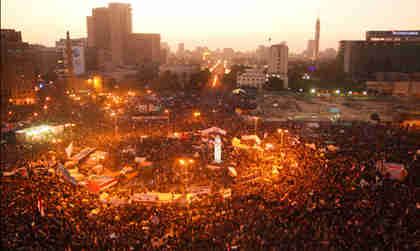 |
Hundreds of thousands of people took to the streets in Egypt on Wednesday, on the first anniversary of the beginning of the Egyptian Revolution that began last year on January 25. Many were protesters complaining that Egypt was worse than it was before the revolution, since the Supreme Council of the Armed Forces (SCAF) is still ruling Egypt, and is following many of the same policies as the deposed dictator, Hosni Mubarak. But there was a second, perhaps larger group of demonstrators who were celebrating -- the huge victory of the Muslim Brotherhood's Freedom and Justice Party (FJP) in the recent free Parliamentary election, winning 41% of the seats. The young protesters that filled Tahrir Square a year ago now fear that the revolution has been hijacked by the Muslim Brotherhood, and that the Brotherhood has made a corrupt deal with SCAF so that they'll both remain in power -- something that the Brotherhood denies. Al-Ahram (Cairo)
The surprise of Egypt's Parliamentary elections was the strength of the religiously conservative Salafist al-Nour party, winning 27% of the seats, showing strength particularly in rural areas that were ignored for decades under the rule of Hosni Mubarak. The Muslim Brotherhood has been putting some distance between it and the al-Nour party, but the al-Nour supporters in Egypt's rural areas do not hesitate to make their beliefs clear:
"Islam is clear. If someone steals his hand will be cut off, killers will be killed, and adulterers will be stoned to death. In that way the whole country will be made safe."
Another supporter adds, "If in this village someone steals something and their hand is cut, do you think someone else will then think about stealing something?" BBC
As they usually do, mainstream journalists and pundits completely missed the broader point of last week's debates, where Newt Gingrich stuck it to Fox's Juan Williams over his racist diatribe, and stuck it to CNN's John King over his feminist diatribe. The broader point has nothing to do with Gingrich, who may or may not succeed in these kinds of retorts.
When the Tea Party burst upon the scene, mainstream journalists "blamed" it on CNBC's Rick Santelli, who made a rant one morning criticizing President Obama's bailout plan. As I pointed out at the time, what was special about this situation was not that Santelli ranted about something -- he rants about something every day -- but that the rant achieved "viral" status and spread around the world, leading to the large Tea Party demonstrations.
The same kind of thing was true with Gingrich's remarks. The point is not that Gingrich was clever (though he was). The point is that the public is finding these 1960s kinds of racist and feminist diatribes to be increasingly tired and stale, indicating that the public is changing, irrespective of what happens to Gingrich.
In a generational crisis era, where corruption and anxiety are rampant, gender roles become more conservative and stereotypical. In America, the pendulum has been swinging back towards greater modesty in women. See, for example, "Victoria's Secret changes from 'too sexy' to 'ultra-feminine'" from 2008, and "'It's going to be the 1950s all over again'" from 2004.
This is the reverse of the trend that began in the 1960s, when male and female stereotypes were supposedly thrown out in favor of "women's equality." The return to stereotypes is happening in America, but it's worth pointing out that the same kinds of changes are occurring throughout the world, because people return to the comforts of religion at times of great distress.
Thus, many Muslim women are returning to the comfort of the hijab, and both Turkey and Egypt have voted to move in the direction of more conservative Muslim precepts, including Sharia law. And I've recently reported that ultra-Orthodox Jews in Israel are moving in a similar direction, with women covering themselves from head to toe with multiple layers of clothing. These trends will be reversed once more, after the next world war.
Wearing a headscarf has been politically contentious in Turkey since the early 1920s, when Ataturk declared Turkey to be a secular state, and headscarves were even banned for decades in public buildings. However, the rise of Prime Minister Recep Tayyip Erdogan of the Justice and Development Party (AKP, pronounced "ahk party") has moved Turkey away from Ataturk's secularism back to its Ottoman roots. Erdogan's wife Emine wears a headscarf, and this provoked an extremely acrimonious political controversy after Erdogan's election. (See "In Turkey, May 16 election may bring Islamist President into power" from 2007.) However, the controvery over headscarves in Turkey appears to have died down, and it's now OK for a woman to wear a headscarf or not, as she wishes.
 |
Some magazine entrepreneurs in Turkey have launched a new magazine called "Âlâ", which is Vogue magazine for women who want a beautiful lifestyle wearing "veiled" fashion. The name of the magazine, which stems from the Ottoman era, means "the most beautiful of the beautiful." The magazine has been completely successful, and only uses models that wear headscarves and only advertises brands specializing in women's clothing that conforms to Islamic customs. Spiegel
A directive was issued by Saudi Arabia's labor ministry on Jan 4, 2012, permitting only women to work in lingerie stores in the kingdom. The ministry’s announcement came after a boycott campaign initiated by Saudi women fed up with the awkwardness of purchasing undergarments from male shopkeepers, most of whom are foreign workers. However, foreign commentators point out that the law is not some sort of feminist victory, but is actually part of a xenophobic pattern to deprive migrant workers from holding all kinds of jobs, as part of a "Saudization" campaign. Indeed, the Saudi Arabian General Investment Authority (SAGIA), which oversees the kingdom's Saudization program, has allowed a grace period for "red" companies that have large numbers of migrant workers, but that grace period expires soon. Every company will have to employ the stipulated number of Saudis or else face severe consequences. Dawn (Pakistan) and Arab News
The Sunni versus Shia realignment of the Mideast that I have been talking about for years is moving into place rapidly, thanks to the Arab Spring. The split between Hamas and Iran, which began last June in earnest when Hamas refused to support Iran's ally, Syria's president Bashar al-Assad, who was slaughtering unarmed Sunni protesters, has now become a chasm. Hamas's disengagement from Iran has been made a lot easier by the surprisingly aggressively position taken by Turkey with respect to Israeli policies -- and specifically the policies involving Gaza -- which came to a head during the Gaza flotilla debacle. The new Turkish pledge to give $300 million to Hamas has soothed Hamas' transition to the Sunni bloc and has paved the way for Turkish leadership in the Palestinian-Israeli conflict. Jerusalem Post
Two weeks ago, Standard & Poor's became the last of the three rating agencies to downgrade Portugal's bond to junk status. This has resulted in forced selling of Portugal bonds by investment funds that are allowed to hold only investment-grade bonds. The yield (interest rates) on Portugal's 3-year bonds reached 19.4% on Wednesday. With Greece headed for default, investors believe that Portugal will be next. Washington Post
The Chinese New Year celebrations formally began on Monday, January 23. China has become 4710 years old as per its lunar calendar. Both the Chinese and Tibetans are known worldwide for their New Year celebrations, which involves family reunions, meeting friends, and conducting prayers. For the Tibetans, however, the celebration of their New Year has been a somewhat muted affair in recent years, with the Chinese government dampening the celebrations by sealing Tibet from the outside world and banning foreigners' travel to Tibet during the period. This will be the fifth consecutive year of such a ban. Institute for Defence Studies and Analyses (IDSA), New Delhi
(Comments: For reader comments, questions and discussion,
see the 26-Jan-12 World View -- Revolutionary and Brotherhood demonstrators fill Egypt's streets
thread of the Generational Dynamics forum. Comments may be
posted anonymously.)
(26-Jan-2012)
Permanent Link
Receive daily World View columns by e-mail
Donate to Generational Dynamics via PayPal
Arab League monitoring in Syria near collapse as GCC pulls out
This morning's key headlines from GenerationalDynamics.com.
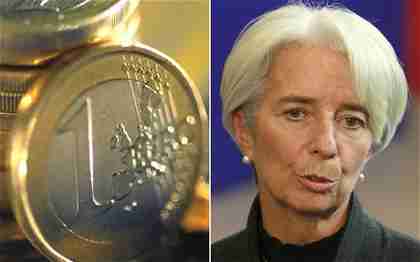 |
It appears more and more that the long knives are coming out, as the days go by with no agreement on how much each entity will have to lose when Greece defaults. The International Monetary Fund (IMF) lead off by cutting its forecast for global growth, warning that the world economy might be derailed. The global recovery is threatened by intensifying strains in the euro area and fragilities elsewhere," said the IMF. IMF managing director Christine Lagarde called on Europe to bolster its rescue funds, which means that core countries, especially Germany, should commit a lot more money. Bloomberg
The IMF, Germany, and some eurozone countries are all demanding that private investors take a larger and larger "haircut," but Charles Dallara, representing the private investors, drew a line in the sand over the weekend. Dallara has said that a net haircut of 65% is their final offer, while Germany and the EU want the private investors to accept a haircut of well over 70%. "Our position is quite clear...[and] is fully consistent with the October 26-27 agreements," Dallara said. "What we asked is that authorities stick to their own commitment." The original "deadline" to reach an agreement was originally early last week. Then it was changed to Friday, then to Monday, and now they're saying that the deal will be reached next week. Market News International
The IMF also demanded that the European Central Bank (ECB) be willing to take a "haircut," along with the private investors. The ECB bought the bonds at below face value as part of a program to prevent the collapse of Greek debt markets in 2010. It has also been accepting Greek bonds as collateral for cheap loans to teetering Greek banks. The bonds, with estimated yields in excess of 7 per cent, will provide a big return if Greece does not default and they are held to maturity. Private investors are objecting to the ECB’s insistence its bonds be paid in full while the private bondholders are being urged to agree to a cut of at least 65% on their holdings. Kathimerini and Financial Times (Access)
German Chancellor Angela Merkel has pledged to Germans that she won't invest another euro in efforts to rescue the currency. But, in the rest of Europe, the grumbling of those who claim that Germany is trying to dictate economic and financial policies to the rest of the EU is growing louder. According to Danish Prime Minister Helle Thorning-Schmidt, "The split is dramatic. That is being massively underestimated in Berlin." Southern European countries, now joined by France, are demanding that Germany put more money -- a lot more -- into the European Stability Mechanism (ESM) to enlarge it significantly to a €1 trillion bailout fund. At the same time, countries like Italy and France are ganging up on Germany, and Merkel's demands for balanced budget requirements for euro countries are meeting increased resistance in Brussels. Der Spiegel
Dubai Airport on Tuesday said it handled a record 51 million passengers last year, an 8% increase over 2010. If the same growth continues in 2012, then Dubai will be the second largest airport in the world, behind London Heathrow. Khaleej Times (UAE)
 |
Egypt's military ruler, Field Marshal Hussein Tantawi said Tuesday in a televised address:
"I have taken a decision to end the state of emergency, in all parts of the country, except in fighting acts of thuggery, starting on the morning of January 25, 2012."
However, activists are calling the announcement phony. "Who do you think are the thugs the military is talking about? It’s the protesters they don’t like," said one. Bikya Masr (Cairo)
Reports indicate that dozens of Buddhist monks were injured and one was killed on Monday when Chinese police fired into a crowd of protesting monks who were chanting for Tibetan freedom and return of their spiritual leader, the Dalai Lama. Unrest is growing again between Tibetans and Han Chinese, as 16 Buddhist monks, nuns and other Tibetans self-immolated in the past year, four in this month alone. AP
 |
The nations in Gulf Cooperation Council (GCC) announced on Tuesday that they were pulling their participants in the Syria observer mission sponsored by the Arab League, following the lead of Saudi Arabia, who made such an announcement on Saturday. The Arab League received approval from Syria to continue the observer mission until February 23, but with far fewer countries participating. The Arab League observer mission is widely considered to be a failure, since the regime of Syria's president Bashar al-Assad has continued slaughtering, massacring, torturing and mutilating unarmed protesters, right under the noses of the Arab League monitors who were supposed to be stopping the violence. Particularly controversial was the the leader of the Arab League mission, Sudan's General Mohammed Ahmed al-Dabi, who is thought to have participated in his own program of slaughtering, massacring, torturing and mutilating innocent people in the Darfur genocide. Syria's Foreign Minister Walid al-Muallem said yesterday that "half the universe" was conspiring against Syria, adding, "It is the duty of the Syrian government to take what it sees as necessary measures to deal with those armed groups that spread chaos." Independent
As the observer mission in Syria nears collapse, the Arab League will ask the U.N. Security Council to approve a resolution condemning the violence in Syria. Such a resolution would be strongly supported by the U.S. and the Europeans, but would be opposed by Russia and China, who have used a veto to block such resolutions. The Russians have expressed deep regret for approving last year's resolution authorizing a no-fly zone over Libya because they say that the West used the limited resolution to conduct a massive, unapproved military operation in Libya. Syria is a close ally of Russia, and have said that they will veto any resolution condemning Syria. Syria's Foreign Minister Walid al-Muallem said:
"A blind man cannot discourse about colors. They want to defy the future of Syria without considering the opinion of the Syrians.Our relations with Russia have deep roots. Russia cannot welcome foreign intervention in Syria. That is too much."
But the pressure on Russia is growing from the Arab League and the West, and with the bloodbath continuing in Syria without letup, Russia may be forced to change its mind. Russia Today
(Comments: For reader comments, questions and discussion,
see the 25-Jan-12 World View -- Euro crisis deadlock leads to finger-pointing and German isolation
thread of the Generational Dynamics forum. Comments may be
posted anonymously.)
(25-Jan-2012)
Permanent Link
Receive daily World View columns by e-mail
Donate to Generational Dynamics via PayPal
Child beggars make big money in Saudi Arabia
This morning's key headlines from GenerationalDynamics.com.
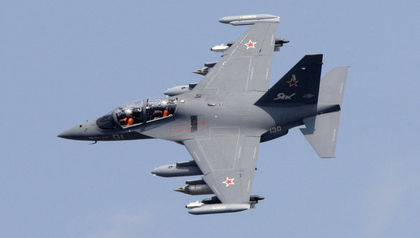 |
Russia and Syria have signed a $550-million contract on the delivery of 36 Yakovlev Yak-130 Mitten combat trainer jets, which can be manufactured in a short time. Under the deal struck in late December, the jets are to be supplied to Syria once Damascus makes a prepayment. However, the worsening situation in Syria makes the deal "risky," according to an analyst, because "the international community, led by the United States, has made a decision to crush Bashar al-Assad’s regime, and this may lead to the contract being disrupted and Russia suffering image and financial losses." The jets are not suitable for attacking insurgents, and the jet cannot endure air battles with Israeli, Turkish, or Western coalition’s aircraft, should a military conflict erupt in Syria. Ria Novosti
In a variation of illegal immigration for jobs, children in Yemen, Somalia, and other neighbors are arranging to be smuggled into Saudi Arabia so they can make money begging. One Yemeni child made about SR100 [100 Saudi riyals = $27] per day, and collected SR24,000 [$6400] during his 8 month stay. "The largest chunk of the money went to the smugglers and I was given very little of it. My brother was caught earlier and deported home," he said. However, many of these children say that they're making a lot of money through begging, and would return to Saudi Arabia again if they were deported. Arab News
 |
Wednesday will be the first anniversary of the January 25 youth uprising that ostensibly replaced dictatorship with democracy. Egypt has just had a successful parliamentary election, with power presumably moving away from the Supreme Council of the Armed Forces (SCAF) to the new Parliament. But many Egyptians are concerned that the two Islamist parties, the more moderate Muslim Brotherhood’s Freedom and Justice Party and the more religiously conservative Salafist al-Nour party have together come away with almost 75 per cent of the vote. The Brotherhood has cooperated closely with the SCAF and has assured Washington that it has no intention of cancelling the peace treaty with Israel. But what concerns many young Egyptians is that the two parties will have a massive say in the drawing-up of the new constitution, which the parties have indicated will incorporate Sharia law. Sharia law can be moderate, as it's been implemented in Turkey, but it can also be very harsh, as it was implemented, for example, by the Taliban in Afghanistan. Many young Egyptians who were very passionate about freedom in the uprising are now concerned about the suggestions of some politicians that they would work to ban the sale of alcohol, ensure modest female dress and encourage women to leave the workplace. Some Salafists are out to create a religious ‘virtue and modesty’ police force armed with batons with which to smack infringers across the legs. The young people who brought down Hosni Mubarak will not be happy with these developments. We may begin to see what trends are developing on Wednesday, when protesters are expected to fill Tahrir Square again, celebrating the anniversary of their last victory. Gulf News and Reuters
Egypt is approaching a major financial crisis which, unlike the ones in European countries, is receiving no international attention. Egypt's foreign exchange reserves fell from $36 billion to $18 billion, falling $4 billion in December alone. Bond yields (interest rates) are above 16%, and even at that rate, few investors are willing to purchase Egypt's bonds. The situation was made worse by the Islamist election victory, which has frightened the business elite. Egypt is the most populous country in the Arab world, and imports half its wheat, but will run out of foreign reserves soon. The first reports of actual hunger in provincial Egyptian towns, meanwhile, are starting to trickle in through Arab-language press and blog reports. A shortage of gasoline accompanied by long queues at filling stations and panic buying was widely reported last week. Asia Times
Boko Haram, the name of Nigeria's terrorist group, is usually translated as "Western education is forbidden," where "haram" means "forbidden." However, Mansur Liman, a native Hausa speaker from BBC's Hausa service was interviewed on the BBC on Monday, and explained the following:
"What Boko means -- and it's annoying to see the media endlessly translating it as "western education" -- That was once true, but it refers in ordinary colloquial Hausa much more to a lifestyle, a set of morals and behavior of an elite who happen to be western educated. But it's not western education, it's the lifestyle of the elite, who basically, whether they're Muslim or Christian, basically despise and ignore the poor. And so of course, ordinary people might well want to - if not join them, then support them.And the real trouble, as the army has said many times -- 'When we attack, we don't know whom we're attacking, because Boko Haram and civilians look the same.'"
Turkey is threatening diplomatic retaliation over an action by France to pass a crazy law that would make it a crime, punishable by a year in jail, to deny that Turkey had committed genocide against the Armenians in 1915. The bill will become law when it's ratified (signed) by France's president Nicolas Sarkozy, which he has promised to do. The Turkish ambassador in Paris, Tahsin Burcuoglu, said that the vote would lead to a "total rupture" of relations between the two countries. "You can also expect that now diplomatic relations will be at the level of charges d'affaires not ambassadors anymore." Charge d'affaires is the lowest rank of diplomatic representative recognized under the Vienna convention on diplomatic relations. Reuters
(Comments: For reader comments, questions and discussion,
see the 24-Jan-12 World View -- Egyptians fear violence on first anniversary of January 25 uprising
thread of the Generational Dynamics forum. Comments may be
posted anonymously.)
(24-Jan-2012)
Permanent Link
Receive daily World View columns by e-mail
Donate to Generational Dynamics via PayPal
Welcome to the Year of the Dragon!
This morning's key headlines from GenerationalDynamics.com.
 |
In Asian culture, the Dragon is the most desirable birth year, especially for boys, since the Dragon is believed to bring luck, strength, nobility, royalty, wisdom and promising future.
 |
Year 2012 marks the reign of the legendary Dragon, the fifth animal in the Zodiac series on the Lunar calendar. It's hoped to bring good fortune for people – promotion, wealth, health, properties, good marriages and new children. Though just a creature of the imagination, the Asians believe that dragons do exist and live in the sky among the clouds -- the nearest place on Earth from heaven. VietnamStamp
This has been kicked around for a few months, but finally the State Department issued a statement saying:
"Ali Abdullah Saleh's request to travel to the U.S. for medical treatment has been approved. As we have indicated, the sole purpose of this travel is for medical treatment and we expect that he will stay for a limited time that corresponds to the duration of this treatment. Specific questions regarding his travel plans should be directed to the Yemeni government."
Saleh has committed to step down next month. Saleh said he would return to Yemen before the official power transfer next month to serve as the head of his ruling party, which some people are interpreting to mean that he'd find a way not to step down, or at least to remain in actual control behind a figurehead he controls. State Department and AP
The Arab League met in Cairo on Sunday and, in a dramatic, historic announcement, said that Syria's president Bashar al-Assad should step down. Oh, wait. There have been a dozen similar announcements in the last few months, so I guess it isn't historic after all. There were other details in the announcement, but they're irrelevant since al-Assad is just going to blow the whole thing off anyway. In related news, the Arab League's observer mission into Syria is in turmoil, because of the following announcement by Saudi Prince Saud al-Faisal on Sunday:
"My country will withdraw its monitors because the Syrian government did not execute any of the elements of the Arab resolution plan. We are calling on the international community to bear its responsibility, and that includes our brothers in Islamic states and our friends in Russia, China, Europe and the United States."
I'm not sure why al-Faisal expects the international community to "bear its responsibility," when the Arab League doesn't seem to bear any responsibility at all. LA Times and Jerusalem Post
 |
Ordinary Chinese are furious that a wealthy couple was able to violate the one-child policy to the extent of having eight children. They had four girls and four boys, born in September and October, 2010, using in-vitro fertilization. The Octomom carried two children herself, while two surrogates each carried three children. The procedure cost nearly a million yuan ($160,000). LA Times
Talks continued in Athens on Sunday over the terms of the next bailout for Greece, even though Charles Dallara, the chief negotiator for the private investors, walked out of the talks, saying that he'd be available by phone. On Sunday, Dallara said that the private investors had reached the limit on what would concede if the Greek default plan was to remain "voluntary," saying that the ball was now in the court of the European Union and the International Monetary Fund (IMF). With private investors being asked to "voluntarily" take 60-70% losses on their investments, investors are trying to keep the losses at 60%, while the EU and IMF want to push them up to 70%. Reuters
Putting aside fears about the European Union's chaos and turmoil, 66% of voters in Croatia on Sunday checked "Yes" to a referendum question to joining the European Union in 2013. Foreign Minister Vesna Pusic said, "With this, we leave behind political instability, but the rest will depend on our ability and creativity. Our chances will be better, but no one will do the job for us." Reuters
There are reports that Israel will not ask for the permission of the US to attack Iran and will only give America a 12 hour warning before the attack. According to the report, Israeli Prime Minister Benjamin Netanyahu does not trust President Obama and is concerned that the American leader would do everything in his power to prevent an attack if he knew about it in advance. The report said that Israel was shocked when it learned that the US-Israel security exercise that had been planned for two years was postponed by the U.S. Al-Bawaba and Israel National News
(Comments: For reader comments, questions and discussion,
see the 23-Jan-12 World View -- Report: Israel will attack Iran without U.S. permission
thread of the Generational Dynamics forum. Comments may be
posted anonymously.)
(23-Jan-2012)
Permanent Link
Receive daily World View columns by e-mail
Donate to Generational Dynamics via PayPal
New delays expected in Greece bailout deal
This morning's key headlines from GenerationalDynamics.com.
 |
Monday is supposed to be the latest deadline for an agreement on the Private Sector Involvement plan (PSI+), which will determine how much money private investors will get when Greece goes into default on March 20. However, Charles Dallara, the representative of the private investors, walked out on the negotiations on Saturday, saying that he would be available by telephone. The private investors are trying to get as much money as possible, and reports indicate that the International Monetary Fund, the European Commission and the European Central Bank aren't happy about discussions that would pay the private investors too much. According to an unnamed source, "Discussions will continue over the phone this weekend but an agreement is unlikely before next week, if there is an agreement at all. Things are complicated, we are getting closer on the numbers but there is still quite some work ahead." Kathimerini and Reuters
I used to make fun of John Mauldin for his ridiculously Pollyannaish newsletters, written to avoid turning off his investor clients who pay him fees. But Mauldin has really come around. His latest newsletter is the best summary of the situation in Greece and Europe that I've seen. He discusses all the options very clearly and in detail, showing why each one leads to disaster. If you have a half hour available, it's well worth the time reading it.
The fact that Mauldin is writing about these things shows how much the common outlook has changed. There was a time not long ago when it violated CNBC's ridiculous policy to not allow anyone to utter the word "Depression" on the air, since that would piss off financial institution advertisers. Those times are gone.
The only thing wrong with the newsletter is that he ends with a list of "solutions" to the problem, which are fatuous and ridiculous. After his lengthy description of the problems, he can't possibly believe that this new set of Pollyannaish ideas are relevant. As I've said many, many times, there is no solution. No solution exists. All they can do is postpone the disaster a little longer, but things seem to be quickening now, and it's going to be very hard to kick the can down the road past March 20. John Mauldin
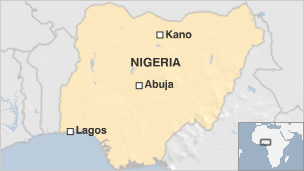 |
In the worst bloodbath in some time, about 150 people were killed and hundred injured in a series of coordinated bombing attacks across the city of Kano in northern Nigeria, flooding and overwhelming hospitals, and sending the region into chaos. The al-Qaeda linked terrorist group Boko Haram took responsibility for the series of explosions that ripped apart police buildings, passport offices and immigration centers around the city. The group claims to want to turn Nigeria into a harshly Islamic state, in a country which is mostly Muslim in the north and mostly Christian in the south. BBC
 |
Kabiru Sokoto, the number two man in the Boko Haram hierarchy, was arrested two weeks ago and put into prison. Within 48 hours, he "miraculously" escaped, when a five-man police team took him out of prison and traveled to his home to search it. There, the police team was overpowered by Boko Haram militants, and Sokoto escaped. No credible explanation has been provided for why Sokoto was required to accompany the police search team, and no credible explanation has been provided for why the the police team was overpowered apparently without a fight. It's widely believed that the police are infiltrated by Boko Haram, and that the home visit was a pre-planned charade to free Sokoto. The Nation (Nigeria)
Boko Haram is perhaps the newest of the al-Qaeda linked groups to gain international attention. The major ones are:
Boko Haram has evolved differently. There's no evidence of direct contacts with al-Qaeda core, meaning that it is unlikely to have directly inherited al-Qaeda's obsession with attacking America. Instead, it seems to have developed out of the long-standing tribal and north-south tensions in Nigeria. It has been cloaking itself in an anti-western rhetoric - its name translates as "western education is forbidden" - and made contact with other regional Islamist groups that shout loudly about global jihad, but its focus remains the sharia-ization of Nigeria. CNN
(Comments: For reader comments, questions and discussion,
see the 22-Jan-12 World View -- Terrorist Boko Haram bloodbath in northern Nigeria
thread of the Generational Dynamics forum. Comments may be
posted anonymously.)
(22-Jan-2012)
Permanent Link
Receive daily World View columns by e-mail
Donate to Generational Dynamics via PayPal
Another nail-biting weekend as Greece bailout talks hit snag
This morning's key headlines from GenerationalDynamics.com.
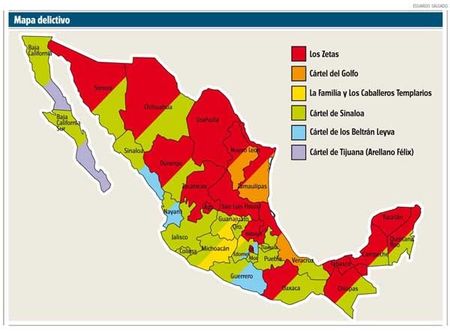 |
A new report and graphic shows that the deadly drug cartel Los Zetas controls criminal activity, drug trafficking, and extortion in over half of Mexico’s territory. The report was obtained by the U.S. National Association of Chiefs of Police yesterday. The map shows that Los Zetas, which is led by Heriberto Lazcano, alias “El Lazca,” controls most of Mexico’s southern regions as well as the Gulf of Mexico. The Sinaloa Cartel comes in a close second behind Los Zetas. The Sinaloa cartel primarily conducts its activities in northern regions. Law Enforcement Examiner
The Spanish company Repsol will begin exploratory drilling for oil in the Gulf of Mexico, using a Chinese-built offshore oil drilling platform that has just arrived in Cuban waters. The island has exclusive rights to 43,000 square miles of “Caribbean Economic Zone” seabed off its coast, which has been parceled into 59 blocks and leased to various oil companies interested in prospecting those areas. According to a study by the US Geological Survey (USGS), the Cuban reserves in the Gulf region amount to 4.6 billion barrels of oil, 10 trillion cubic feet of natural gas and 0.9 billion barrels of liquid natural gas. The oil drilling platform has been inspected by American technicians to verify that it doesn't violate the U.S. economic embargo -- namely, to verify that less than 10 percent of the rig’s components are US-made. Havana Times
The Dept. of State is seeking explanations from Russia over a ship that apparently delivered Russian weapons to Syria, breaching existing sanctions on Syria. The ship was briefly inspected when it docked in Cyprus, but customs officials were prevented from examining four containers of cargo. Cypriot media said the ship was carrying from 35 to 60 tons of ammunition and explosives meant for the Syrian Defense Ministry. The Russians left Cyprus claiming that they weren't going to Syria, but they showed up in Syria's port of Tartus the next day. Ria Novosti
Thailand has "officially recognised the state of Palestine and officially informed all permanent and observer missions to the United Nations in New York of this development," according to a Thai official on Friday. Thailand recognized the state along the lines that existed before the 1967 Six-Day War. Thailand's announcement brought to 131 the number of countries that recognise a Palestinian state. Bangkok Post
It's interesting to watch analysts on TV say that a final deal on Greece's bond haircut is only hours away, and hear the same thing hour after hour and day after day. But as of Friday evening, there was no agreement on the "Private Sector Involvement Plan" (PSI+) that determines how much money private investors will get when Greece defaults on its March 20 bond payment. The amount of money will depend on the interest rates of the "coupon payments" that the bondholders collect every year, and the investors are demanding more than the Greeks are willing to pay. However, they have discovered a brand new way to kick the can down the road. Instead of using a fixed interest rate, they're going to use "step up" bond coupons with interest rates that are low at first, and increase as time goes on. Anyway, Monday is supposedly the new deadline for getting a deal done, and they'll probably want to get it done by early evening Sunday ET, before the Asian markets open on Monday morning. Kathimerini
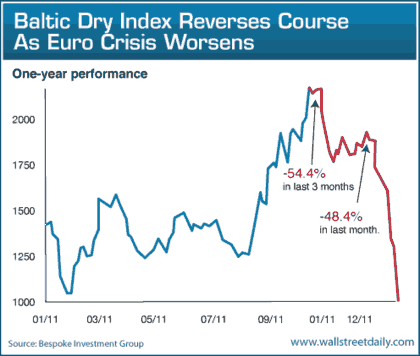 |
In late 2008, when worldwide trade and transportation almost came to a standstill, one sign of the situation was a 95% crash in the Baltic Dry Index (BDI). The Baltic Dry Index is a measure of shipping costs for cargoes in "capesize" vessels -- vessels that are too large to fit through the Suez or Panama canals, and so must go around the Cape of Good Hope or Cape Horn. These vessels transport the huge cargoes of copper, iron ore and other commodities. In 2008, the crash was caused by a precipitous drop in demand from China, which reversed in 2009 thanks to China's huge quantitative easing program. One factor in the current fall might be that more capesize ships have come online, increasing supply. However, it's more likely that Chinese demand is falling sharply again, as the exports have been falling for several months, and the housing bubble began to implode in October. Wall Street Daily
France's president Nicolas Sarkozy is suspending its training of Afghan soldiers and French troops may pull out of Afghanistan completely, ahead of the planned 2013 date. The announcement came after four French soldiers were killed and 16 wounded, 8 of them seriously, when an Afghan soldier they were training opened fire on them on Friday morning. "The French army stands side by side with its allies but we can't accept that a single one of our soldiers be killed by our allies," Sarkozy said. There are about 3,800 French troops in Afghanistan, with 400 having pulled out since last October. Eighty-two French troops have died in Afghanistan since the fall of the Taliban in 2001. With a presidential election approaching, France's participation in Afghanistan is a campaign issue, as many French oppose the Afghan war. Radio France Internationale
(Comments: For reader comments, questions and discussion,
see the 21-Jan-12 World View -- France may withdraw early from Afghanistan after soldiers' deaths
thread of the Generational Dynamics forum. Comments may be
posted anonymously.)
(21-Jan-2012)
Permanent Link
Receive daily World View columns by e-mail
Donate to Generational Dynamics via PayPal
North Korea's ambassador to Germany caught and released
This morning's key headlines from GenerationalDynamics.com.
 |
Just two days after American forces completed their withdrawal from Iraq, prime minister Nouri al-Maliki of Iraq's Shia-led government issued an arrest warrant for Iraqi Vice President Tareq al-Hashemi, the highest level Sunni official in the government. Al-Hashemi fled to the northern Iraq region controlled by the Kurdistan regional government. The clampdown on Hashemi and other Sunni ministers triggered a new wave of Sunni attacks against the Shia, raising questions about the sustainability of the government. Though nominally neutral, Turkey, a Sunni state, appears to have taken the side of Hashemi, especially with the remarks by Recep Tayyip Erdogan, where he urged the Iraqi leadership to take swift measures to reduce tensions in Iraq, which were caused by the al-Hashemi arrest warrant. Erdogan also appeared to be criticizing Iran when he warned other countries endeavoring to exert influence in Iraq to act in a prudent and responsible manner. The dispute has drawn a harsh response from al-Maliki, accusing Erdogan of meddling in Iraq's affairs, providing further ammunition to al-Maliki and his Shia bloc to take a stand against Turkey, to bolster their position in Iraq domestic politics. Jamestown
The alliance between Hamas, which governs the Gaza Strip, and Iran never made much sense because Hamas is a Sunni society and Iran is a Shia country. The wedge that finally split them apart was the Arab Spring and Iran's support for Syria's president Bashar al-Assad. Hamas has supported the opposition, as it became clear that al-Assad's regime was slaughtering and mutilating thousands of innocent Sunni Arab protesters. Hamas' split with Iran has opened up sectarian splits within Gaza itself, where there is a small but growing community of Shia converts, some of them fighters from Hamas' political opponent, Islamic Jihad. The result is a growing sectarian rift within Gaza, which exploded into the open on Saturday, when Hamas security forces stormed a gathering of Shia Muslims, commemorating the death of Imam Hussein, the Prophet Mohammed's grandson. The National (UAE)
China has been cutting oil purchases from Iran in half, not because of the West's intended oil embargo against Iran, but because of a dispute between the two countries over payment for past oil purchases. According to Debka's subscriber-only newsletter (sent to me by a subscriber), when China turned to Saudi Arabia as its replacement supplier, the Saudis proposed a deal on nuclear aid, which has now resulted in a historic accord. As a result, the Saudis will go forward and develop their own nuclear weapons program with China's assistance. Although the timetable is not yet known, an intrinsic part of their deal is a Saudi guarantee to cover all China's oil needs if Iranian supplies become unavailable. The Sino-Saudi nuclear deal was a wholly unexpected shock to Washington, and a bitter bombshell to the Iranians, who feel that their Chinese ally is now stabbing them in the back. Debka
The preceding three stories indicate major political realignment trends that are consistent with the expected lineups that I've been writing about for years, based on generational trends. As I've said, the expectation is that the approaching Clash of Civilizations world war will pit the "axis" countries -- China, Pakistan, and Sunni countries -- against the "allies" -- the U.S., India, Russia, Iran and Israel. Iran in particular is in a generational awakening era with a growing pro-Western population of young people, pitted against an aging hardline Muslim bureaucracy of survivors of Iran's last generational crisis war, the 1979 Great Islamic Revolution, followed by the Iran/Iraq war. The "Arab Spring" particularly has sped up these realignment trends.
There was supposed to be a deal by Wednesday between Greece and the private investors (mostly banks and hedge funds) that hold Greek bonds, so that it would be available when officials from the "troika" (the International Monetary Fund (IMF), European Central Bank (ECB), and the European Union (EU)) visit Greece. But Finance Minister Evangelos Venizelos told Parliament on Thursday that the technical details will be available on Friday, for a completed deal by the time the Eurogroup council of eurozone finance ministers meets. Kathimerini
As with so many things I write about, this would be hilarious if the consequences weren't so serious. Everybody now pretty much agrees that Greece will default on its March 20 payment, so the question now is whether the default will be orderly or disorderly, and how much the private investors will have to lose. The Greeks want to pay as little as possible to the private investors, and the private investors want as much as possible. Since the bonds are to subject Greek law, Greece is able to retroactively change the law so that private bondholders get as little money as Greece wants. Hedge funds are threatening to sue Greece in that event, and the court of choice will be the European Court of Human Rights, since that court considers property rights to be human rights. Kathimerini
The International Monetary Fund (IMF) is asking countries of the world to give them an additional $500 billion, to increase their total lending capacity to $1 trillion. President Obama's administration has already said that it won't provide more cash to the IMF. The IMF is pushing China, Brazil, Russia, India, Japan and oil-exporting nations to be the top contributors. It's an amazing time in history -- whenever there's any problem, the solution is an explosive increase in public debt. Bloomberg
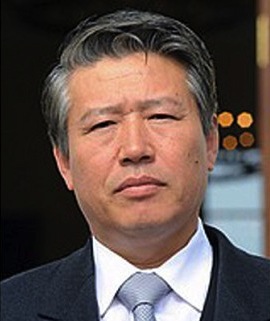 |
Police discovered a man fishing on the Havel River in Berlin's Spandau neighborhood on Sunday afternoon. When the officials asked to see the man's fishing license, he responded by saying he was Si Hong Ri, the North Korean ambassador. When this was verified, the officers then told the ambassador to cease his illegal fishing activities. According to the police report "the ambassador politely acknowledged (the request) with a smile and continued with the offense." The police were unable to do anything, given the man's diplomatic immunity. Spiegel
(Comments: For reader comments, questions and discussion,
see the 20-Jan-12 World View -- Sectarian tensions cause geopolitical realignment in the Mideast
thread of the Generational Dynamics forum. Comments may be
posted anonymously.)
(20-Jan-2012)
Permanent Link
Receive daily World View columns by e-mail
Donate to Generational Dynamics via PayPal
Cameron accuses Argentina of 'colonialism'
This morning's key headlines from GenerationalDynamics.com.
(Computer problems - just a bare bones posting today)
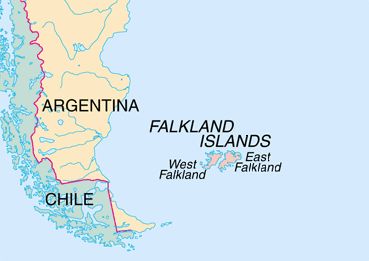 |
In 1982, Britain won a brief war against Argentina over the Falkland Islands, a former British colony, called the Malvinas Islands by Argentina, who claim the islands as their sovereign territory. Now, 30 years later, tensions are growing again, especially because both sides have been exploring for oil. On Wednesday, Britain's prime minister David Cameron said that all military defenses were in order in the Falklands, and:
"The key point is we support the Falkland Islanders' right to self-determination, and what the Argentinians have been saying recently, I would argue is actually far more like colonialism because these people want to remain British and the Argentinians want them to do something else.I'm determined we should make sure that our defences and everything else is in order, which is why the National Security Council discussed this issue yesterday.
The absolutely vital point is that we are clear that the future of the Falkland Islands is a matter for the people themselves, and as long as they want to remain part of the United Kingdom and be British they should be able to do so."
Argentina's acting President Amado Boudou called Cameron's remarks "an ignorant and dumb outburst of historical reality," and added:
Everybody knows how the United Kingdom acted with colonialism. There are signals and consequences in every continent of what colonialism did to those people, the subjugation, and it saddens us to listen to this fallacy and outburst.This is a strange outburst that falls outside any reasonable analysis."
The Falkland/Malvinas Islands are located in the south Atlantic over 400 nautical miles from Argentina, a British protectorate since early 1800's. Argentina has repeatedly claimed sovereignty over the islands. Last December, President Cristina Kirchner accused Britain of "taking Argentine resources" and ignoring UN resolutions as she called for renewed talks about the future of the archipelago. London Telegraph and Buenos Aires Herald
(Comments: For reader comments, questions and discussion,
see the 19-Jan-12 World View -- Tensions rise on 30th anniversary of Falklands/Malvinas war
thread of the Generational Dynamics forum. Comments may be
posted anonymously.)
(19-Jan-2012)
Permanent Link
Receive daily World View columns by e-mail
Donate to Generational Dynamics via PayPal
Indonesia will use concrete balls to keep people off train roofs
This morning's key headlines from GenerationalDynamics.com.
 |
The European Commission, the executive branch of the EU, on Tuesday sent three "Letters of Formal Notice" to Hungary, thereby launching "infringement proceedings" against three laws that took effect on January 1 allegedly violating EU treaties. The three laws allegedly reduce the independence of Hungary's central bank, discriminate against judges, and violate requirements to protect citizens' personal information online. EU President José Manuel Barroso said: "Hungary, like all Member States, is obliged by the EU Treaties to guarantee the independence of its National Central Bank and its Data Protection Authority and the non discrimination of its judges. The Commission is determined to take any legal steps necessary to ensure that the compatibility with European Union legislation is maintained." Europa
Two weeks ago, Hungary's Premier Viktor Orbán appeared to be backing down in the face of warnings from the EU, including the EU's refusal to discuss a bailout of Hungary unless the laws are rescinded. But now, Orbán has struck back by demanding to speak to the European Parliament on Wednesday presumably to refute the charges. The last time that Orbán spoke to the European Parliament was a year ago, over a new media law that allegedly limited political free speech. The visit provoked an extremely vitriolic debate, and Orbán was forced to back down. Associated Press and Financial Times (Access)
Bruce Richards, CEO of Marathon Asset Management LP, a hedge fund firm heavily invested in Greece's bonds, says that Greece is nearing a deal with private investors that calls for them to take 32 cents per euro, or a 68% haircut, near the high end of the 60-70% range that I reported yesterday. According to Richard, Greece won't make its €14.5 billion bond repayment scheduled for March 20, but that won't be necessary because of this deal. Does anyone want to set up a pool to pick the day when this new deal will fall apart? Bloomberg
Bruce Richards' "leak" may have come about because of a perceived need to bolster market confidence in reaction to statement earlier in the day from Fitch Ratings Service that Greece is insolvent and probably won't be able to honor its March 20 bond payment. According to Fitch, "The so-called private sector involvement, for us, would count as a default, it clearly is a default in our book. So it won’t be a surprise when the Greek default actually happens and we expect it one way or the other to be relatively soon." Bloomberg
Intelligence units in Turkey's Security General Directorate (EGM) have warned police across the country to be prepared for a possible bomb attack on United States assets, such as the Embassy or the Consulate General, conducted by Iran's Revolutionary Guard or the Quds Force. Lebanon-based Hizbollah may also plan to participate. Iran is becoming increasingly angry at Turkey for three reasons:
Iran has interpreted Turkey’s role in the international community as a threat against its interests, and is convinced the US and Israel are its archenemies seeking to destroy Iran. Turkey is concerned that Iran is leading a new rise of the Shiite Crescent in the region, supporting Shia-backed political blocs in other countries, such as Syria, while creating chaos in those ruled by Sunni leaders, such as Bahrain. Concerns are being expressed on both sides that "the brotherhood of Iran and Turkey, which spans centuries, [may] fall apart." Zaman (Istanbul)
 |
After numerous failed attempts to persuade people to stop riding on the roofs of train cars, officials are hoping the threat of injury, or even death, will put a stop to the already dangerous practice. The railway announced on Wednesday that it planned to install hanging deterrents in the form of rows of concrete balls that will stop anything — living or dead — in its tracks. A railway spokesman said the concrete balls would be hung at rooftop height at several stations, and at train crossings. "With this method, we hope the passengers will no longer sit on the train roof, as it is dangerous," said an official. Can you believe this? Jakarta Globe
Border disputes between China and India have been getting increasingly vitriolic in the last few years. India and China on Tuesday agreed to set up "a working mechanism on border management" to deal with important affairs related to maintaining peace and tranquility in the border areas. However, it appears to be nothing but a public relations stunt, since it will "undertake other tasks that are mutually agreed upon by the two sides, but will not discuss resolution of the Boundary Question or affect the Special Representatives Mechanism." The Hindu
(Comments: For reader comments, questions and discussion,
see the 18-Jan-12 World View -- Turkey issues nationwide terrorist alert from Iran's Revolutionary Guard
thread of the Generational Dynamics forum. Comments may be
posted anonymously.)
(18-Jan-2012)
Permanent Link
Receive daily World View columns by e-mail
Donate to Generational Dynamics via PayPal
United Nations will train Arab League observers in Syria
This morning's key headlines from GenerationalDynamics.com.
 |
The consequences of last week's S&P downgrade of France's AAA debt rating are starting to roll out. S&P downgraded Europe's new bailout fund, the European Financial Stability Facility (EFSF) from its previous AAA rating, pointing out that EFSF can't have an AAA rating if one of its major guarantors (the other being Germany) doesn't have an AAA rating. However, France's downgrade is a political blow to France's president Nicolas Sarkozy, just 100 days before presidential elections. Last year, Sarkozy had promised to do everything possible to retain France's "national treasure," its AAA rating. "We are confronted by an unprecedented crisis that forces us to cut spending, lower our deficits but also to find the path to new growth by resolving our competitiveness problems," Sarkozy said. According to an opponent, "It’s not France that has been downgraded, it’s a policy, it’s a strategy, it’s a team, a government, a president." Bloomberg and Expatica France
Analysts say that Greece has only till the end of this week to finalize the details of the bailout agreement negotiated last year and announced on July 21, if Greece wants to avoid bankruptcy in March. Existing holders of Greek bonds will have to lose 50% or more of their investment, but negotiations collapsed last week over the exact amount of the "haircut." Prime Minister Lucas Papademos expressed the usual bubbly optimism, and said, "We will manage in time to reach an agreement that will be accepted by everyone." A new negotiating meeting is scheduled for Wednesday, and details must be agreed in time for a meeting of EU officials on Friday. According to Moody's, a haircut exceeding 50% will have serious consequences, and could force Greece to leave the euro, and return to the drachma currency. Kathimerini and Reuters
Just for fun, I did a quick computation on how much bondholders will be losing. Suppose you have a $1,000 Greek bond that you expected to redeem in March. As I reported last week, according to the negotiations so far, the 50% haircut plan means that you'll get $150 in cash, plus a $350 bond redeemable in 30 years.
Since the bond can't be redeemed for 30 years, you make a net present value computation, assuming that the market interest rate for the next 30 years will be 6%, and you get a present value of the bond as $350/(1.06^30)=$60. That's the present value of the bond, and the amount you could get if you sell it to someone else right away. So now your $1,000 bond is worth only $150+60=$210.
But actually you get more money than that, because there's also a "coupon payment" that you receive each year - and this is where the disagreement is. The French and the Greeks want to keep it low, at 2% per year. If you apply the annuity formula to that, you get the the present value of ALL your coupon payments is $96, so your $1,000 bond is now worth $150+60+96=$306, for a 69.4% haircut, rounded to 70%.
The investors want at least 4% coupon payments. The present value of those payments is $192, so your bond is now worth $150+60+192=$402, for a 59.8% haircut, or 60%.
So if an agreement is reached between all the parties, then the "haircut" will be a lot more than 50% -- it will be at 60%-70%.
But there are two other alternatives: If Greece simply defaults, then your bonds will be worthless, but some investors, namely hedge funds who have CDS insurance policies, will receive a full payment by collecting on the insurance. So they're going to try to block any agreement.
And the final alternative, the one predicted by the "Kick the Can Theory" that I proposed last year, is that European officials will simply give Greece a new €14.5 bailout loan in March, as they've done before. In that case, they'll have kicked the can down the road once more, but the good news is that you'll be able to redeem your March bond for the full $1,000, with a 0% haircut.
 |
While France's bond prices were not affected much by Friday's downgrade of the debt of nine eurozone nations, Portugal's bonds, which were downgraded to "junk" status, were hit very hard on Monday. Many classes of investors permit only investment grade bonds in their portfolios, so the downgrade to junk status meant the forced selloff of a large volume of Portugal's government bonds, pushing prices sharply down and yields (interest rates) up. The yields on 2-year and 5-year government bonds rose to 13.46% and 16.80%, respectively, while the 10-year rose to 15.67%. As the adjoining graph shows, Portugal, which has already been bailed out once, is well on its way to following the same path as Greece, and may require more bailouts soon. Bloomberg
The Hungary crisis continues to grow, even though it's eclipsed in the news by the Greece crisis. On Tuesday, Brussels is expected to formally warn Hungarian prime minister Viktor Orban that it will take Hungary to the European Court of Justice unless his government voluntarily changes new laws that critics say undermine the independence of the country’s central bank. Hungary is in desperate need of a €15-20 billion bailout, but the EU and International Monetary Fund have said they won't start talks on the bailout unless the laws are changed. Irish Times
After being made fools of by Syria's Bashar al-Assad regime, who continued mutilating and slaughtering people right under their noses, the 150 or so Arab League observers are going to get some help from the United Nations on how to be better observers. The training will done by specialists from the UN High Commissioner for Human Rights, after an Arab League meeting on January 22. Meanwhile, the slaughter and butchery go on every day. Bloomberg
Iraq summoned the Turkish ambassador in Baghdad on Monday to complain about statements by Turkish officials, including comments earlier this month by Turkish Prime Minister Tayyip Erdogan, who said a Sunni-Shia conflict in Iraq, if unleashed, could engulf the entire Islamic world. Iraq said the remarks amounted to meddling in its affairs, a sign of increasing tension between the two countries. Iraq under Saddam Hussein was governed by the Sunni minority, but is now governed by the Shia majority, and has close relations with Iran. Fears of renewed sectarian conflict in Iraq have increased since U.S. troops withdrew last month and Maliki's Shi'ite-led government sought the arrest of a Sunni vice president on accusations he ran death squads in the Saddam Hussein days. Turkey, which has a Sunni majority but is officially secular, has attempted to play a moderating role as rivals Shia Iran and Sunni powerhouse Saudi Arabia jockey for influence in the region. Reuters
(Comments: For reader comments, questions and discussion,
see the 17-Jan-12 World View -- Euro crisis faces major tests this week
thread of the Generational Dynamics forum. Comments may be
posted anonymously.)
(17-Jan-2012)
Permanent Link
Receive daily World View columns by e-mail
Donate to Generational Dynamics via PayPal
Falling earnings estimates portend falling stocks
This morning's key headlines from GenerationalDynamics.com.
 |
Hakimullah Mehsud, the leader of the Pakistani Taliban (Tehrik-e-Taliban Pakistan - TTP), has reportedly been killed by an American drone strike on January 12. If true, this kill would be greatly welcomed, since TTP has been responsible for numerous terrorist attacks, attacking Nato soldiers and Afghan officials in Afghanistan, and Shia and Sufi worshipers in Pakistan. The conclusion that Mehsud was killed was reached by intercepting wireless radio chatter between Taliban fighters detailing how Hakimullah Mehsud was killed while traveling in a convoy to a meeting in the North Waziristan tribal region near the Afghan border. However, on at least two occasions in the past, officials announced that Mehsud was dead, only to be proved wrong by new videos on Youtube. Reuters
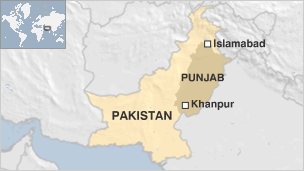 |
Hundreds of Shia Muslim worshipers were killed by terrorists in Pakistan during 2011, and a new attack on Sunday killed 18 people, injuring 30 others, when a remote-controlled bomb exploded near a procession on a Shia Muslim holy day. No one has yet claimed responsibility for the attack, but they have been targeted by al-Qaeda and Taliban linked Sunni Islamist groups that claim that Shia Islam is apostate. Daily Times (Pakistan) and BBC
Growing tensions between the United States and Israel over military plans to counter Iran's nuclear development have caused the U.S. to postpone a joint military exercise, "the largest and most significant joint exercise in the allies' history," from May until the end of the year. The reason being given for postponement of the "Austere Challenge 12" exercise is "budgetary constraints." It was originally announced over the Administration's concern that Israel would preemptively attack Iran without notifying the U.S., but now the exercise is apparently being delayed for the same reason. 9,000 American troops have already landed in Israel for the military exercise, and plans for them have not been announced. Israel has been critical of the Administration for its reluctance to attack Iran, and tensions rose further this week when Secretary of State Hillary Clinton denied "absolutely" any U.S. involvement in the killing of an Iranian nuclear scientist, indirectly appearing to imply that Israel and Israel alone was responsible. LA Times and Debka
American Joint Chiefs of Staff Chairman Martin Dempsey will travel to Israel this week to calm relations between the two countries, and to encourage Israel to stay calm with respect to Iran, and allow sanctions to work. However, Moshe Yaalon, Israel's vice prime minister, and a close confidant of PM Benjamin Netanyahu, is expressing disappointment in the Obama administration on Sunday, saying "election-year considerations" lay behind its caution over tough Iran sanctions. He contrasted the administration's posture to that of France and Britain, which he said "are taking a very firm stand and understand sanctions must be imposed immediately". Reuters and Fox News
Al-Qaeda on the Arabian Peninsula (AQAP) on Saturday have seized the town of Radda, meeting little resistance. AQAP has previously been in control of several towns in the southern province of Abyan, so the capture of Radda, north of Abyan and just 170 km southeast of Yemen's capital Sanaa, presents a new threat and a setback to efforts to restore order in Yemen. AQAP has been taking advantage of nearly a year of internal turmoil over demands that President Ali Abdullah Saleh step down to take control of areas in Yemen’s south. Yemen Observer and Reuters
Israeli and Palestinian negotiators met on Saturday in Amman for the third time this year -- not to negotiate, but just to talk. The talks, sponsored by King Abdullah II of Jordan, were a last-ditch attempt to spark a new "peace process," something that was never going to happen. The non-negotiation talks are scheduled to end on January 26, and Palestinians have said that they won't resume unless the Israelis stop building West Bank settlements, and agree to negotiate starting from the pre-1967 borders. Palestinian Authority president Mahmoud Abbas is touring European capitals as part of a broad diplomatic initiative, starting January 27, to isolate and pressure Israel. The National (UAE)
 |
The adjoining graphic contains a fair amount of bad news. It shows the analysts' estimates of earnings per share (EPS) for the S&P 500 stocks, and how those estimates have changed over time. It shows that estimates for Q4 were high early in 2011, but since July have been falling steadily, and are now at $24.09 earnings per share, and continuing to fall. Politicians and analysts who have been predicting a full-fledged return of the stock market bubble have based those predictions on steadily increasing earnings, and those assumptions are now failing. Q4 earnings report season begins on Monday, so we should have some answers soon. This is all happening at a time when China's real estate bubble is finally deflating, and Europe's public debt is close to explosion. The Generational Dynamics prediction that a full fledged global financial panic and crash is coming with 100% certainty has not changed. Zero Hedge
(Comments: For reader comments, questions and discussion,
see the 16-Jan-12 World View -- U.S.-Israel tensions grow over military action in Iran
thread of the Generational Dynamics forum. Comments may be
posted anonymously.)
(16-Jan-2012)
Permanent Link
Receive daily World View columns by e-mail
Donate to Generational Dynamics via PayPal
Venezuela's Chávez says U.S. is giving cancer to Latin leaders
This morning's key headlines from GenerationalDynamics.com.
 |
Qatar has led the Arab League in deploring the violence in Syria, but is now advocating a major step forward, according to the emir of Qatar, Sheikh Hamad bin Khalifa al Thani, in an interview to be broadcast on Sunday evening. When asked, "Would you be in favor of Arab nations intervening in Syria?" the emir said "For such a situation to stop the killing...some troops should go to stop the killing." State Dept. officials are saying that a consensus is forming in Washington and Arab capitals that diplomatic attempts to end the multiple crimes against humanity being committed by the regime of Bashar al-Assad are an embarrasing shambles. In the most likely scenario for military intervention in Syria, Turkey will take the lead, establishing a buffer zone within Syria, while the Nato would establish a no-fly zone over western Syria. States supporting the war, either diplomatically or with troops, include Saudi Arabia, Bahrain, Qatar, Jordan, Kuwait, and Morocco. CBS News 60 Minutes and Telegraph
Anwar Malek, an Algerian national, who resigned last week as one of the observers in the Arab League mission to Syria, saying that the mission was a "farce," now says that he survived a personal assassination attempt, but had to flee Syria for his life. "That's the moment I decided I couldn't take any more," said Malek, who is now in France, where he lives with his wife and daughter. "Blackmail ranged from threats of death, to public humiliation. We were meant to be monitoring a peace-keeping effort but instead watched people being killed, beaten up, and arrested by police, soldiers and militiamen." According to Malek, "Any negative comments were ignored, and the authorities tried to blackmail us into keeping what we saw a secret. Our mobile phones were blocked, and we were told not to use email or social networking sites like Facebook to post information. This included reports of young children being shot dead, or being left to starve along with the rest of their families. They did not even have the most basic provisions, while prisoners were given one snack a day if they were lucky. Those that survived were terrorized daily." Telegraph
 |
Officials in Beijing and Washington are breathing a sigh of relief today, as the incumbent president, Kuomintang Party (KMT) leader Ma Ying-jeou, won reelection with 51% of the vote, defeating Tsai Ing-wen of the Democratic Progressive Party (DPP). As we reported yesterday, KMT is promoting closer relations between Taiwan and China, with eventual reunification of the two, while the DPP supports greater separation from China, with Taiwan eventually becoming a separate country. There had been concerns that if the DPP candidate won the election, then China would retaliate in some way. The victory of the KMT candidate puts those concerns to rest. China Post (Taipei) and China Daily (Beijing)
The deputy chief of Iran's joint armed forces, Masoud Jazayeri, said:
"We consider committing a terrorist act of killing a scientist to be a threat to the nation... We are looking at punishing those who were behind the scenes of the martyrdom (assassination) of Mostafa Ahmadi Roshan. ...The enemies of the revolution and the Iranian nation’s progress should not harbor doubt that the U.S., the Zionist regime, and their criminal allies will receive appropriate response and punishment in due course."
He was the third nuclear scientist to have been murdered in similar circumstances in Tehran over the past two years. Iran's supreme leader, Ayatollah Ali Khamenei, said on Thursday that the "abominable" killing was committed "with the planning or support of the intelligence services of the CIA and Mossad" of the United States and Israel. Tehran Times and AFP
 |
Venezuela's president Hugo Chávez has suggested that the United States has developed new technology that can give people cancer, and that the CIA is using it to give cancer to Latin American heads of states. Chávez himself is recovering from cancer, and he made his "suggestion" the day after Argentina's president Cristina Fernández de Kirchner announced she had been diagnosed with thyroid cancer. Recent years have seen a series of leftwing Latin America leaders diagnosed with cancer, including Brazil's current president, Dilma Rousseff, Paraguay's Fernando Lugo, and the former Brazilian leader Luiz Inácio Lula da Silva. According to Chávez, in a speech broadcast on live TV:
"Would it be so strange that they've invented the technology to spread cancer and we won't know about it for 50 years?I don't know but … it is very odd than we have seen Lugo affected by cancer, Dilma when she was [presidential] candidate, me, going into an election year, not long ago Lula and now Cristina.
It is very hard to explain, even with the law of probabilities, what has been happening to some leaders in Latin America. It's at the very least strange, very strange. Evo take care of yourself. Correa, be careful. We just don't know. Fidel always told me, 'Chávez take care. These people have developed technology. You are very careless. Take care what you eat, what they give you to eat … a little needle and they inject you with I don't know what.'"
In July last year Evo Morales suggested that the CIA might deliberately plant drugs on Bolivia's presidential plane in order to discredit his government. Guardian
(Comments: For reader comments, questions and discussion,
see the 15-Jan-12 World View -- Consensus is growing for military action in Syria
thread of the Generational Dynamics forum. Comments may be
posted anonymously.)
(15-Jan-2012)
Permanent Link
Receive daily World View columns by e-mail
Donate to Generational Dynamics via PayPal
Taiwan's presidential elections crucial to relationship with China
This morning's key headlines from GenerationalDynamics.com.
 |
With Greece requiring its next bailout payment of €14.5 billion by March to avoid bankruptcy, Greece's negotiations with the Institute of International Finance (IIF), the body representing the investors holding toxic Greek bonds, broke down on Friday. The IIF said that the discussions had "paused for reflection":
"Despite the efforts of Greece's leadership, the proposal put forward, which involves an unprecedented 50% nominal reduction of Greece's sovereign bonds in private investors' hands … has not produced a constructive consolidated response by all parties.We very much hope, however, that Greece, with the support of the euro area, would be in a position to re-engage constructively with the private sector with a view to finalizing a mutually acceptable agreement on a voluntary debt exchange.
Under the circumstances, discussions with Greece and the official sector are paused for reflection on the benefits of a voluntary approach."
Translation: Bondholders have resigned themselves to "voluntarily" losing more than 50% of their investment, but are balking at the terms of the "voluntary debt exchange." There are two specific areas of disagreement. One is the interest rate that the new bonds will pay, in terms of regular "coupon bond" payments -- investors want more than 5%, while the Greeks don't want to pay more than 4%, and the Germans, who are the biggest payers of bailout money, want it to be at 2%. The second disagreement is over investor demands that British law govern the new bonds, so that it will be impossible in the future to use "collective action clauses" (CACs) to retroactively force investors to take a further haircut on the new bonds. Greece's finance minister, Evangelos Venizelos, said that everything is just fine, and more talks are scheduled for Wednesday. Kathimerini and Guardian
In a denial of the Pollyannaish nonsense we've been hearing from European politicians, Standard & Poor's ratings service on Friday downgraded the debt of two formerly AAA-rated countries -- France and Austria -- as well as the debt of seven other European countries. Perhaps most significant was France's downgrade, since France's AAA rating was a lynchpin of the AAA rating of Europe's EFSF bailout fund program. (That is, investors would contribute to the EFSF fund only if it were AAA rated, and that would be because France guaranteed the fund and had an AAA rating.) However, Germany retained its AAA rating, as did Finland, the Netherlands and Luxembourg. Portugal and Cyprus were both cut to junk status. S&P said the move reflects a combination of economic and financial factors, as well as "an open and prolonged dispute among European policymakers over the proper approach to address challenges." Telegraph and CNN
 |
Israelis were shocked by the recent stories of Ultra-Orthodox Jews who were spitting at an eight year old girl because her arms weren't covered, or who dressed their own kids up in Nazi concentration camp uniforms, but these stories are part of the growing influence of the Ultra-Orthodox in Israel. Until now, the trend has been noticeable only in Jerusalem or near Tel Aviv, but increasingly it's appearing in places where secular Israelis live. The most obvious public sign is gender-separation and women who cover themselves from head to toe with multiple layers of clothing. They call themselves "women of the shawl," but secular Israelis call them the "Taliban." In some ways, Israel resembles Iran more than Europe. It is a country where there is no civil marriage, and where rabbis rule on weddings and divorces. It is also a country where ultra-orthodox schoolchildren learn neither mathematics nor English, where every kindergarten and every military battalion has a rabbi, and where an infrastructure minister wants to place power plants under the supervision of rabbis so that even electricity will be in compliance with religious purity laws. All of these things have been around for decades, but now orthodox radicals are increasingly occupying key positions, thereby imposing their stamp on the secular majority. Spiegel
Taiwan is voting for a new president on Saturday. There are three candidates running, but there are two major ones, and the two represent vastly different policies for relations with China, meaning that this election could have effects far outside of Taiwan's watery borders. The incumbent is President Ma Ying-jeou of the Kuomintang (KMT) party, and the principal challenger is Tsai Ing-wen of the Democratic Progressive Party (DPP).
Polls currently show the race is too close to call. A DPP victory would infuriate China and trigger some kind of retaliation. Bloomberg
The "1992 Consensus" was an agreement between representatives of Taiwan and mainland China in 1992, where they agreed that there was only "One China." They agreed to disagree on what that term meant, but they both agreed that one day, Taiwan would be reunited with China. The KMT party supports the 1992 Consensus, and the DPP party rejects it. Beijing's view is that without the consensus, relations between Taiwan and mainland China would become "unpredictable." Xinhua
(Comments: For reader comments, questions and discussion,
see the 14-Jan-12 World View -- Greece bailout talks near collapse as S&P downgrades European countries
thread of the Generational Dynamics forum. Comments may be
posted anonymously.)
(14-Jan-2012)
Permanent Link
Receive daily World View columns by e-mail
Donate to Generational Dynamics via PayPal
Russia's last aircraft carrier puts on feeble PR show with Syria
This morning's key headlines from GenerationalDynamics.com.
 |
On January 8, a Russian aircraft carrier group led by the Admiral Kuznetsov, visited the port of Tartus on the coast of Syria in the Mediterranean Sea. Syria's Bashar al-Assad regime made the most of the PR visit as a show of solidarity between Syria and Russia -- and indeed, Russia is supply the Assad regime with weapons. But the Kuznetsov is Russia's last carrier, and is in disrepair, and the sea salvage tug Nikolai Chiker had to shadow the Kuznetsov during its present tour to tow the hapless carrier back home if the main engine breaks down again. Its flight deck was almost empty, and it lacks the capability to defend itself, making it a sitting duck. The Russian ships sped away from Syrian waters within two days, and are expected to return to the safety of home by early February. Jamestown
Pakistan appears to have backed away from a feared fourth military coup on Thursday, after the army reacted to the government's sacking of the defense minister by announcing a new commander for its 111 Brigade, which has historically played a key role in previous military coups. The government is constitutionally scheduled to go to the polls until 2013, but the government has been sufficiently weakened by the power struggle with the army that it may be force to hold elections by the end of January. The government and the army have never had an easy relationship, but tensions began to rise greatly after the U.S. killing of Osama bin Laden on Pakistani soil, near an army base, leading many in the government to believe that the army had known all along that he was there. The Australian
 |
The government of Burma (Myanmar) signed a cease fire agreement with the Karen ethnic group, represented by the Karen National Union (KNU), after decades of an off and on civil war. According to a government official, "The president has said we brothers have been angry at each other for 63 years and he asked us to give the KNU what they want. That's why we came here." Burma gained independence in 1948, but then had a bloody civil war among different ethnic groups, reaching a climax in 1958. In October, 2007, Burma's army overreacted to demonstrations by protesters, led by Buddhist monks. Hundreds of activists and citizens were shot dead or burned alive in government crematoriums. Thousands of monks were rounded up and detained. Some were found floating face down in rivers. A new government came to power last March, and it has been trying to reach out to ethnic groups as part of a program of reforms. AFP
When I first started out developing Generational Dynamics, I was puzzled by this question: How come the United States never had a Civil War II, several decades after the Civil War? I finally decided that there were two major reasons: First, there was a generous Reconstruction program (which later served as a model for the Marshall Plan); and second, the war had been fought not along an ethnic or racial (black/white) fault line, but along a geographic (north/south) fault line, and that fault line was largely dissolved by the westward march.
Burma's civil war was across ethnic fault lines, and those aren't so easily dissolved. When a country goes from one civil war to the next one decades later, there are often alternating periods of conflict and peace agreements, and that may well be what's happening now. Burma's new government seems to be determined to reform, and undoubtedly a major motivation is to not follow the path of China after the 1989 Tiananmen Square massacre. It remains to be seen whether that will be successful for long.
Global oil prices fell 4% on Thursday, after the European Union announced that an oil embargo, rumored for the end of January, would be postponed six months. Greece, Italy and Spain, all in the midst of economy crises, are heavy purchasers of Iranian oil, and would need additional time to find alternate suppliers. Relations between Iran and West took a new spike downward this week, after the assassination of an Iranian nuclear scientist by an unknown assailant. Iran is accusing Israel of responsibility, and planning retaliation, but analysts point out that Israel is not the only possibility. The Iranians attempted to assassinate the Saudi Arabian ambassador to the United States recently, and the Saudis may have carried out the scientist's assassination in retaliation. It's also possible that internal divisions within Iran itself led to the assassination. Reuters
(Comments: For reader comments, questions and discussion,
see the 13-Jan-12 World View -- Burma (Myanmar) signs peace agreement with Karen ethnic group
thread of the Generational Dynamics forum. Comments may be
posted anonymously.)
(13-Jan-2012)
Permanent Link
Receive daily World View columns by e-mail
Donate to Generational Dynamics via PayPal
Pakistan in governmental crisis as 'Memogate' scandal continues
This morning's key headlines from GenerationalDynamics.com.
 |
Pakistan's Prime Minister Yousaf Raza Gilani on Wednesday fired defense secretary Naeem Khalid Lodhi "for gross misconduct," for saying that the army makes its own decisions, and that the government did not have "operational control" over the army and the intelligence service, the Inter-Services Intelligence (ISI). This is the latest move in a power struggle between Pakistan's army and its civilian government that has grown since the U.S. operation that killed Osama bin Laden on Pakistan's soil, and many government officials expressed suspicions that the army knew all along that bin Laden was there. The "Memogate" scandal exploded in November when Husain Haqqani, Pakistan's ambassador to Washington at that time, was accused of having written a memo asking for Washington's help in preventing a military takeover of the government, led by President Asif Ali Zardari. Zardari, a Shia Muslim figure, has had tense relations with the largely Sunni Muslim army, and he's suspected of having approved the memo. The latest sacking has ratcheted up the tensions, and raised fears of a possible coup. Al-Jazeera and Express Tribune (Pakistan)
In the first attack a target in Pakistan's tribal region since November 17 by an unmanned American drone, at least four militants were killed by missiles fired from the drone on Wednesday. It's believed to be extremely unlikely that the U.S. gave Pakistani authorities advance notice of the attack, since experience has shown that notifying the Pakistanis means that the militants flee the target location before the drones hit. Reuters
France's well known journalist, Gilles Jacquier, was killed on Wednesday in the city of Homs during an official visit sponsored by Syria's ministry of information. Jacquier was killed, along with eight Syrians, when mortar bombs or grenades exploded near them. Homs, with a population of 1 million, is more a warzone than a city, with the majority Sunni population increasingly separate from the Alawite minority. It has suffered badly during the unrest. Parts of the city are without electricity or phones and shortages are rife. Snipers on rooftops are a regular hazard. It is not known which side is responsible for the Jacquier's death. Guardian
Anwar Malek, an Algerian national, resigned on Wednesday as as one of the observers in the Arab League mission to Syria, saying that the mission was a "farce," and was falling apart:
"What I saw was a humanitarian disaster. The regime is not just committing one war crime, but a series of crimes against its people.The snipers are everywhere shooting at civilians. People are being kidnapped. Prisoners are being tortured and none were released."
Malek said that security forces did not withdraw their tanks from the streets, but just hid them and then redeployed them after the observers left. A second observer, asking not to be named, is planning to resign on Friday:
"The Syrian authorities have exploited the weakness in the performance of the delegation to not respond. There is no real response on the ground.The military gear is still present even in the mosques. We asked that military equipment be withdrawn from the Abu Bakr al-Siddiq mosque in Deraa and until today they have not withdrawn."
Al-Jazeera and Reuters
 |
Secretary of State Hillary Clinton on Wednesday:
"But instead of taking responsibility, what we hear from President Assad in his chillingly cynical speech yesterday was only making excuses, blaming foreign countries, conspiracies so vast that now it includes the Syrian opposition, the international community, all international media outlets, the Arab League itself. And I want to commend the Arab League for showing real leadership. I think that it’s clear to both the prime minister and myself that the monitoring mission should not continue indefinitely. We cannot permit President Assad and his regime to have impunity. Syrians deserve a peaceful transition. We are looking to work with the Arab League when the current monitoring mission expires on January 19th. And we look again to the prime minister for his leadership."
It appears that January 19 will be another decision day on Syria. State.gov
Secretary of State Hillary Clinton said on Wednesday, "I want to categorically deny any United States involvement in any kind of act of violence inside Iran," following Iran's announcement that a terrorist bomb had killed Mostafa Ahmadi Roshan, an Iranian nuclear scientist. It's thought that Clinton felt it was necessary to make this denial, because tensions have risen so high between Iran and the West, especially last week when Iran threatened to close the Strait of Hormuz. However, Iranian authorities are saying that the attack is similar to earlier killings of Iran's nuclear scientists, and the current attack bears the hallmarks of an Israeli hit. AP
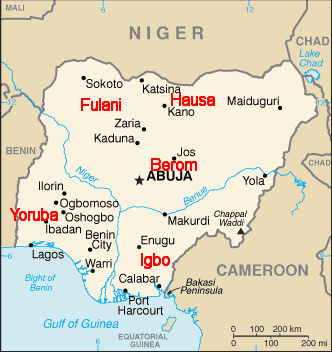 |
A mosque and Islamic school were attacked on Tuesday in the southern Nigerian city of Benin, killing five people. It follows a separate attack on a separate mosque in the city on Monday. It's suspected that these are attacks against Muslims by Christians seeking revenge for attacks by the Islamist terror group Boko Haram against Christians in the north. The attacks are causing Christians in the north and Muslims in the south to flee their homes in fear of violence. Some people are saying that what's going on reminds them of the prelude to the bloody civil war of the late 1960s. "We see the nation heading towards civil war. We know that the civil war was preceded by problems - serious killings on both sides of the regional divide," said Nigerian writer and Nobel laureate Wole Soyinka. However, from the point of view of Generation Dynamics, a new civil war is impossible at this time, since only two generations have passed since the crisis civil war of the the late 1960s. BBC
(Comments: For reader comments, questions and discussion,
see the 12-Jan-12 World View -- French journalist killed in Syria during visit to Homs
thread of the Generational Dynamics forum. Comments may be
posted anonymously.)
(12-Jan-2012)
Permanent Link
Receive daily World View columns by e-mail
Donate to Generational Dynamics via PayPal
Assad gives fiery speech promising to continue violence in Syria
This morning's key headlines from GenerationalDynamics.com.
 |
An uncompromising Bashar al-Assad gave a highly inflammatory televised speech on Tuesday promising to continue his bloody violence, blaming the uprising on "foreign violence," and promising to strike "terrorists with an iron fist." Opposition figures said his speech indicated that he was "alienated from reality," and said the speech was an "incitement to violence, incitement to civil strife." Assad ridiculed the Arab League, which had humiliated him in November by suspending Syria's membership. Assad claimed that the Arab League monitors in Syria were his idea -- even though he did everything he could to resist them, and only caved in when the Arab League threatened to turn the whole issue over to the U.N. Security Council, indicating a major break with the Arab League countries. Some opposition figures were shown banging a picture of Assad with their shoes, a major insult in the Arab world. Al-Arabiya and Guardian
Israel Defense Forces (IDF) Chief of Staff Benny Gantz said Tuesday that Israel is preparing to absorb Alawite refugees from Syria, once Syrian President Bashar al-Assad's regime collapses, which he expects to happen in the coming months. The Alawites are a small ethnic group within Syria, but they're protected by al-Assad himself is an Alawite. The downfall of al-Assad would be a major blow to Syria's Alawite community. "Assad cannot continue holding on to power and his downfall is expected to cause a crack in the radical axis," said Gantz. I've heard of the "axis of evil," but I've never heard of the "radical axis" before. I'm going to guess that Gantz is talking about the Iran-Syria-Hizbollah axis. According to Gantz, "Assad is not the same type as [Former Libyan leader Muammar] Gaddafi, who fights until the last bullet down in the sewer. The day that the Syrian regime will fall, it will issue a blow to the Alawites, and we are preparing to absorb those refugees." Haaretz
Suppose you're the owner of some Greek bonds. If Greece defaults, then your bonds may end up being worthless, unless you were smart enough to insure them with credit default swaps (CDSs). Otherwise, it depends on the kind of bailout agreement that European officials make with Greece, and the biggest stumbling block is the size of the "haircut," the percentage of your investment that you would automatically lose. It was originally supposed to be 21%, then it became 50%. Here's the current status of the negotiations:
So if you're a bondholder, then you'll get 15% of your investment back in cash, and you'll be able to sell your new 35% bond to someone else at some fraction of 35%, and it may be a small fraction, since the bond isn't redeemable until you're all dead.
Will you then be able to collect on your CDSs (if you have them)? That depends on whether European officials can provide enough pressure (extortion) on the committee from the International Swaps and Derivatives Association (ISDA) that makes the decision whether a "credit event" has occurred.
One thing that I learned today is that "sovereign bonds" (bonds issued by a government), unlike corporate bonds, can have their terms changed retroactively by the issuing government under something called a "Collective Action Clause." Apparently it's unknown whether applying the Collective Action Clause triggers a credit event in all cases, but European officials will apply as much political pressure (extortion) as possible to make sure that it doesn't. Some hedge funds are going to demand that a credit event be triggered, so that they can collect on their CDSs.
Greece has a bond payment of €14.5 billion due in March, and they have no money to pay it. So if history is any guide (and it is), then European officials will stall on making a decision until the very last minute, allowing as much time as possible to apply multiple extortion measures to investors and the ISDA.
According to the "Kick the Can Principle" that I proposed last year, European officials will do the minimum possible to get through March, and use fraud and extortion to postpone the problem for a few days or weeks more. CNBC
ROFLMAO! Bloomberg
 |
The Battle of Bannockburn, on June 24, 1314, was a great victory for Scottish forces against superior English forces. It was the climax of the First War of Scottish Independence, and established Scotland as an independent nation. It wasn't until the bloody War of the Spanish Succession in the 1700s decade that Scotland officially became part of the United Kingdom, and subject to the British crown, forever and for all time. Well, maybe not. If Alex Salmond of the Scottish Nationalist Party (SNP) has his way, then in 2014, just after the 700th anniversary of the Battle of Bannockburn, Scotland will hold a referendum on Scottish independence. "I think [Britain's prime minister] David Cameron is a liability. It should be the Scottish Parliament that decides when to hold the referendum. The more he intervenes, the more he will attract Scots to independence," he said. Independent (Paragraph and title corrected - Independence would be from the United Kingdom, not from Britain. 11-January)
(Comments: For reader comments, questions and discussion,
see the 11-Jan-12 World View -- Scotland may declare independence from the UK in 2014
thread of the Generational Dynamics forum. Comments may be
posted anonymously.)
(11-Jan-2012)
Permanent Link
Receive daily World View columns by e-mail
Donate to Generational Dynamics via PayPal
Islamists plan next steps as they dominate Egypt's parliament
This morning's key headlines from GenerationalDynamics.com.
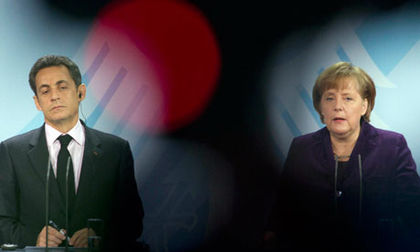 |
I know, Dear Reader, that you're sick and tired of reading exactly the same speeches from European officials every week, and I'm certainly tired about writing about them, but here we go again. German Chancellor Angela Merkel and French President Nicolas Sarkozy held their first joint press conference of the new year, in an attempt to stall for more time. Saying that medium term outlook for the euro is good, Merkel said that we must now strengthen the euro through "more Europe, not less Europe."
"But we haven’t won back trust yet. Convincing the markets is the big challenge. ... The currency was introduced as a visionary step, the foundations weren’t sufficiently prepared.It’s not as if in Europe there’s no money to improve weaker members. We have to aim for excellence, for best practices, and not just somehow end up with mediocrity. Then as a continent, we’d have no chance."
Is there anyone left who actually believes this stuff? Bloomberg
Even the most pessimistic forecasts last year by the International Monetary Fund (IMF) for Greece this year were for a 3% contraction in Greece's economy. But now it seems that Greece's economy is headed for a nightmare contraction of 7% this year, according to the Economist Intelligence Unit. All this means that the government will need to find ways of securing an extra €2 billion this year, at least. Kathimerini
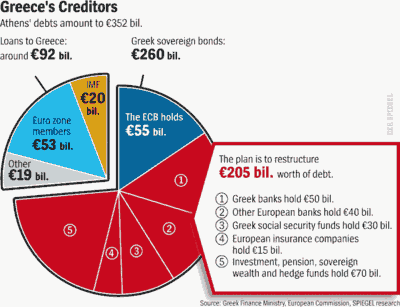 |
If you were paying attention last year, Dear Reader, you may recall that the Sarkozy and Merkel heralded a new momentous €109 billion ($157 billion) agreement on July 21 to bail out Greece, that would solve Greece's debt problems once and for all, once a few details had been worked out. Well, that plan was never going to work anyway, any more than the previous plans did, those tiny little details have STILL not been worked out. At issue is the "haircut" that Greece's bond holders will have to take. On July 21, it was to be a 21% "voluntary" haircut, which meant that all the investors would nicely agree to lose 21% of their investments without complaining. Then, when it became clear that 21% wasn't enough, the voluntary haircut was raised to 50%. But now, it's clear that the European assumptions were "unrealistic" (I would say "fraudulent") from the start. But officials are not as honest as to admit the impossibility of their own mission. Instead, they continue to stall for time, pinning its hopes on private investors coming around. But negotiations with private investors are stalled, and unless there's a resolution soon, Greece will be bankrupt in March. Let's see if they kick the can again. Spiegel
A Tibetan monk died Sunday morning after drinking kerosene, throwing it over his body and setting himself on fire, to protest Chinese rule. The "body exploded into pieces" before police took it away. Angry Tibetans carried the remains through the streets. Police first refused to give up the body but relented after "the protesters smashed windows and doors of the local police station." This incident followed two previous self-immolations on Friday. Tibetans are protesting Chinese control over Tibetan life and culture. Chinese officials have promised to strengthen the management of monasteries and "to push forward the patriotic and legal education among monks and nuns." India Times and Radio Free Asia
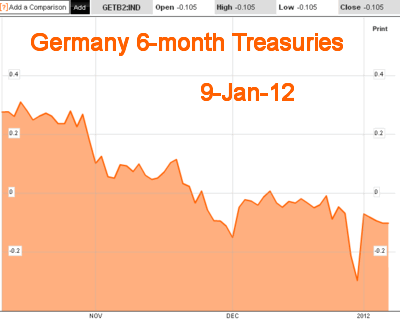 |
You hear financial pundits on TV all the time saying that the Fed cannot offer Treasuries at interest rates below zero, but that's never been true. 0% may be a psychological barrier, but from the point of view of the markets, it has no particular significance. On Monday, Germany auctioned €3.9 billion of six-month bills at negative yields (interest rates) -- at -0.105%. They've been trading at even lower rates recently, but Monday was the first time in history that a government auction yielded negative rates. From the point of view of the markets, it means that the demand for these German notes was so great that investors bid up the purchase price so that it was higher than the German government promised to pay to redeem them in six months. German notes are considered by many to be the safest investment in Europe, and so investors wishing to protect their assets are willing to pay Germany to hold their money for them. These kinds of situations are expected to increase as the global deflationary spiral continues, and cash becomes the safest investment. Bloomberg
Having won 2/3rds of the seats in Egypt's parliament in the first free elections since the overthrow of president Hosni Mubarak, Egypt's two major Islamist parties are planning their next steps. The more moderate Freedom and Justice Party (FJP), the political wing of the Muslim Brotherhood, won 41% of the seats in the new parliament, while the more conservative Salafi al-Nour party came in second, with nearly 27% of the seats. The remaining seats were split among a dozen or so liberal parties. However, Brotherhood officials are denying that the FJP is planning to form a governing coalition with the al-Nour party, and are considering possible collaborations with more liberal parties. According to one Brotherhood official, "I don’t think we will have clear collaboration between us and the Nour Party as a coalition. I think that they’ll be in the opposition." On Islam
Growing assertiveness by China in claiming vast regions of the South China Sea that historically were part of other countries has raised questions among China's neighbors whether to focus on diplomacy, or adopt tougher rhetoric and become more confrontational with China. The previous government of the Philippines, led by Boomer generation president Gloria Macapagal-Arroyo, emphasized peaceful and norms-based approaches to the disputes, and the avoidance of confrontations with China. But Generation-X president Benigno Aquino III took office in June 2010, and has been leading a more assertive policy. The Aquino government has been openly critical of China’s assertiveness and is advocating a multilateral, rules-based approach to the disputes, in contrast to China’s oft-stated preference for bilateral talks. The new policy calls for determining which maritime areas are disputed and which are not, as a starting point in negotiating a joint cooperation zone. It has also expressed readiness to bring the issues before international adjudication, which China opposes. Chinese media reports, meanwhile, expressed suspicion that the Philippine proposal aims to provide the United States an opportunity to become involved in the disputes. S. Rajaratnam School of International Studies (RSIS)
 |
Turkey is taking a new step to avenge the passage of a bill by France's National Assembly making it a crime to deny that Armenian genocide. A Turkish manufacturer is selling "Sarkozy" brand baby diapers, trash bags, and toilet paper. You can place your order at http://www.sarkozy.com.tr/. Turkey is also selling male condoms carrying the name of French MP Valerie Boyer, the author of the bill in question. Pan Armenian
(Comments: For reader comments, questions and discussion,
see the 10-Jan-12 World View -- Merkel and Sarkozy put on first road show of the new year
thread of the Generational Dynamics forum. Comments may be
posted anonymously.)
(10-Jan-2012)
Permanent Link
Receive daily World View columns by e-mail
Donate to Generational Dynamics via PayPal
Nine million to celebrate the Black Nazarene Feast on Monday in Philippines
This morning's key headlines from GenerationalDynamics.com.
 |
Philippines President Benigno Aquino III advised the nearly nine million devotees joining the Black Nazarene Feast on Monday to be vigilant as the government received reports of possible terror threats, and announced increased security precautions at the Quiapo Church in Manila. The Black Nazarene is the patron saint of Quiapo. The life-size image of the Black Nazarene shows a "black" Jesus Christ carrying a cross. The statue was brought to Manila by a Spanish priest in 1607. It was aboard a ship that caught fire, the image was burned, and it came to be known as the "Black Nazarene." Sun Star (Manila)
Under pressure from the al-Qaeda linked Turkestani Islamic Party (TIP), which has conducted numerous terrorist attacks in Xinjiang province, China is putting increasing pressure on Pakistan to control the militants in the Federally Administered Tribal Areas (FATA), where TIP terrorists are being trained by al-Qaeda, or to allow China to set up military bases in Pakistan. TIP's attacks on Xinjiang threaten China's core interests in several ways:
TIP is targeting not only Xinjiang, but also Chinese citizens and projects in Pakistan itself. The situation is becoming increasingly unsustainable, leading China to diverge from its long-state policy of "non-intervention" in the affairs of other countries, and to keep PLA (People's Liberation Army) troops in other countries to protect Chinese interests, something they've criticized the U.S. for doing for decades. They've already violated that principle by deploying 300 armed police to the the lawless triple-border area of the Golden Triangle (Laos, Thailand and Burma) in a joint patrol, following the murders of Chinese workers on the Mekong River. China may now go even further, by deploying PLA soldiers to both Pakistan and Afghanistan, to keep the TIP terrorists under control. Jamestown
 |
A bitter split has developed between Yemen's president Ali Abdullah Saleh and Vice President Abdu Rabu Hadi, at a time when "Arab Spring" riots and demonstrations have been continuing. Demonstrators have been demanding that Saleh step down, and the Saudi-led Gulf Cooperation Council (GCC) drew up a plan for him to do so. Several times, Saleh said he'd sign the plan, but then at the last minute he refused each time. Finally, in November, he signed the GCC plan, agreeing to step down on February 15, and turn power over to Hadi. But now it appears it's just another stalling maneuver, and Saleh has no intention of stepping down. Saleh is furious with Hadi's actions in recent months, including his steadily decreasing the powers of the president and his most ardent loyalists under the terms of the GCC deal. The Saleh-Hadi rifts adds a major new element of instability to a country that the west fears is close to becoming completely unstable. Al-Qaeda on the Arabian Peninsula (AQAP) is headquartered in Yemen, and it's feared that an unstable Yemen will allow an al-Qaeda takeover. CNN
Syria's authorities are calling the visit of a Russian naval task force, led by the Admiral Kuznetsov aircraft carrier, to the port of Tartus a "show of solidarity with the Syrian people." It was just six weeks ago that Russian military officials specifically denied that the Kuznetsov would be visiting the port of Tartus. Ria Novosti and Ria Novosti (11/29)
(Comments: For reader comments, questions and discussion,
see the 9-Jan-12 World View -- Instability in Xinjiang causes China to threaten Pakistan
thread of the Generational Dynamics forum. Comments may be
posted anonymously.)
(9-Jan-2012)
Permanent Link
Receive daily World View columns by e-mail
Donate to Generational Dynamics via PayPal
Orthodox Christians celebrate Christmas
This morning's key headlines from GenerationalDynamics.com.
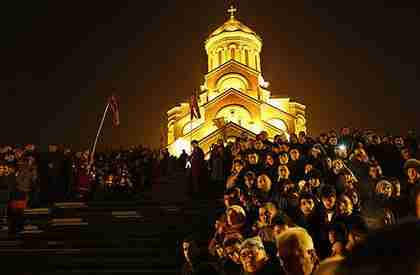 |
Many Orthodox Christians, including Russians, Greeks, Serbs and Montenegrins, celebrate Christmas on January 7, according to an older calendar. Political leaders join citizens in religious services, including in former communist countries, such as Russia. Tradition also calls for a 40-day fast before Christmas, during which the pious do not eat meat, dairy products or eggs. The fast ends at midnight and gives way to sumptuous feasts, but those should not start before one has attended a religious service. Some Christians in southern and eastern Europe marked the feast of Epiphany Friday, a religious holiday celebrating the revelation of God as man. Young men in Bulgaria dived in cold waters in a contest to retrieve a cross. According to belief, the person who captures it will be freed of evil spirits or other troubles. VOA
Egypt's Coptic Christians breathed a collective sign of relief when a complex midnight Christmas service in Cairo's Abbassiya Cathedral went off without a hitch. Last year, more than 20 people were killed in an apparent suicide bombing as hundreds of worshippers were leaving Al-Qidissin (The Saints) church in the Mediterranean city of Alexandria after a New Year's Eve service. This year, a massive security plan was launched, and the service was attended by members of Egypt's ruling military council, including chief of staff General Sami Anan. AFP
Gabriel Cadis, the chairman of the Jaffa Orthodox Church Association, was stabbed to death in Jaffa, Israel, on Friday night during a march to mark Orthodox Christmas. However, police do not suspect a religiously motivated attack. Six suspects, all members of the Christian community in Jaffa, were arrested on Saturday. Jerusalem Post
 |
Patriarch Kirill, the head of the Russian Orthodox Church, on Saturday urged the government to listen to protesters demanding free elections. At the same time, he warned the protesters against being used by those fighting for political power, comparing the opposition leaders to the Bolsheviks whose 1917 revolution brought down czarist Russia. "We destroyed the country, and why did this happen? Because in general the just protests of the people were cleverly used by political forces fighting for power." Kirill, who has close ties with the Kremlin, is walking a fine line between appearing sympathetic to the protesters, but not wanting them to go too far. The Russian Orthodox Church was all but destroyed by the Bolshevik Revolution, and did not begin to revive until World War II, when Josef Stalin asked for the Church's help in fighting the Nazis. AP
Britain said Saturday it believed there was a heightened threat of "terrorist attacks" in the Kenyan capital Nairobi and that attacks "may be in the final stages of planning". It said attacks could be "indiscriminate" and target "Kenyan institutions as well as places where expatriates and foreign travelers gather, such as hotels, shopping centers and beaches". "We strongly advise British nationals to exercise extra vigilance and caution in public places and at public events," the statement added. Britain's warning comes two days after police in Nairobi issued fresh terror alerts. Provincial Police Chief (PPO) Anthony Kibuchi said, "We have received a new threat from al-Shabaab that the most notorious terror group al-Qaeda has joined and has threatened to carry out terror activities. ... I once again appeal to everybody in Nairobi to continue to be extra alert and to take the security measures being undertaken positively whatever social, political or economic status one might be holding." AFP and Capital FM (Nairobi)
Kenya's fighter jets bombed al-Shabaab camps in southern Somalia on Saturday. "Levels of casualties were very high in air strikes on Friday Provisional casualties are that al-Shebaab lost 60 or more fighters, and more than 50 were injured," according to a Kenyan army spokesman. However, the number of deaths can't be independently verified, and is in question. However, there are now three different armies attacking al-Shabaab in Somalia -- the Kenyans, the Ethiopians, and the United Nations authorized African Union forces. With fighting on multiple fronts, al-Shabaab are believed to be struggling financially, after losing a key source of income when they pulled out of fixed positions in the capital Mogadishu last August. Africasia
Adamawa State in northern Nigeria has imposed a curfew after six gunmen on Friday evening shot eleven people and unleashed terror on innocent worshipers at the Christ Apostolic Church in Yola, the state capital. This follows a series of terror attacks against Christians by the Islamist terror group Boko Haram. However, Boko Haram has not claimed responsibility for Friday's attack, and the killings occurred only a few days before state elections, leading some politicians to claim that these attacks were the handiwork of the the ruling government, to further divide the state between Muslims and Christians. Tribune (Nigeria)
(Comments: For reader comments, questions and discussion,
see the 8-Jan-12 World View -- Britain warns of increased risk of terror attack in Kenya
thread of the Generational Dynamics forum. Comments may be
posted anonymously.)
(8-Jan-2012)
Permanent Link
Receive daily World View columns by e-mail
Donate to Generational Dynamics via PayPal
Sarkozy invokes Joan of Arc in France's presidential election campaign
This morning's key headlines from GenerationalDynamics.com.
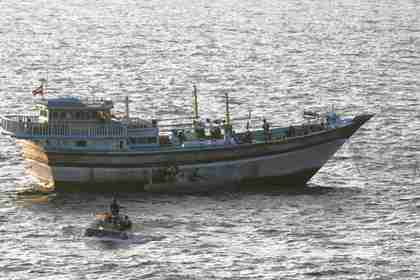 |
If you're a Buddhist, it's Karma. If you're a Persian, it's Kismet. Either way, the U.S. Navy, hated by Iran and ordered to get out, rescued 13 Iranian fishermen held hostage by Somali pirates in the Arabian Sea, only days after Iran warned the U.S. to keep its ships out of the Persian Gulf. Sailors from the guided-missile destroyer Kidd, part of the the John C. Stennis aircraft carrier strike group, boarded the Iranian dhow Thursday and detained 15 Somalis after one of the fishermen was able to reveal in a radio communication that his vessel's crew was being held captive. The Stennis is the ship that Gen. Ataollah Salehi, head of Iran's army, advised Tuesday not to return to the Persian Gulf after the carrier had passed through the Strait of Hormuz. LA Times
As many as 26 people were killed on Friday when a suicide bomber detonated explosives near a bus in Damascus, the capital of Syria. Two weeks ago, dozens were killed by a pair of car bombs in Damascus. What's interesting about these terrorist attacks is that no one is claiming responsibility for them, which is something that al-Qaeda linked terrorists always do. Thus, opposition leaders are saying that the regime of president Bashar al-Assad is responsible for the bombings, in order to provide proof to the Arab League observers that it's necessary for the regime to continue its violence. BBC
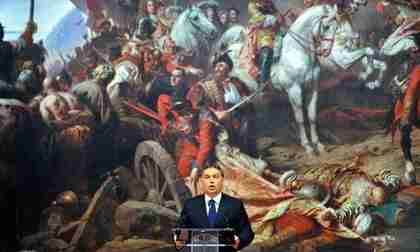 |
Hungary's Premier Viktor Orbán has been forced to back down on a series of policies designed to give him increased power, as the economy and the currency have weakened, leading the Fitch Ratings Service to downgrade Hungarian debt to junk status. Orbán had been seeking to take control of the country's central bank, thus depriving it of its political independence. This and other policies caused the International Monetary Fund (IMF) and the European Union (EU) broke off talks last month on Hungary's bid for a bailout after Orbán refused to withdraw a new central bank regulation the institutions said may undermine monetary-policy independence. Now, Orbán is backing off, and begging for the IMF to return to negotiations. Bloomberg
Hungary's Premier Viktor Orbán rose to prominence as a popular anti-communist who won a landslide victory last year by promising "a new social contract" and to create 1 million new jobs. Those jobs haven't materialized, but what has materialized is a new constitution with provisions that are being described as anti-democracy. One is a new media law that creates a national media and communications board with the power to impose large fines for news coverage that is unbalanced or "offensive to human dignity." Another provision essentially withdraws official recognition and tax-exempt status from more than 300 religious denominations, denying any official place in society for Muslim, Buddhist, or Hindu congregations unless they have operated in Hungary for at least 20 years. He also changed the official name of the country from "Republic of Hungary" to just "Hungary." Earlier this week, tens of thousands of Hungarians took to the streets of Budapest, calling Viktor Orbán a "Viktator," accusing him of leading Hungary from being a democratic republic to a dictatorship. RFE/RL
While all eyes were focused on Greece and Italy, Hungary suddenly popped up and threatened default. Although Hungary is not in the eurozone, a default would still imperil eurozone banks, just as a default by Greece would do. On Thursday, the euro hit new lows against the dollar and the pound, as a combination of falling retail sales in the eurozone and a sharp drop in German factory orders knocked investors' confidence. France's president Nicolas Sarkozy had this warning about the end of the euro:
"The euro is the heart of Europe. If the euro is destroyed, it's the whole of Europe that goes up in smoke. If Europe goes up in smoke it's the peace of our continent that will be one day or another be called into question."
The principal original motivation for the European project, the European Union, and the euro currency was to create an infrastructure that would prevent a new war like the bloody wars that crushed Europe early in the 20th century. Sarkozy is saying that those wars could return if the euro collapses. From the point of view of Generational Dynamics, that's absolutely right. Telegraph
 |
France's President Nicolas Sarkozy paid tribute to Saint Joan of Arc (Jeanne d'Arc) on Friday, on the 600th anniversary of her birth, and in doing so, took a slap at an opponent. Sarkozy said France had to defend Joan of Arc as "a symbol of our unity" and chastised "those who use her as a symbol to divide." The last was a reference to Marine Le Pen, head of the National Front (FN) party, who for decades have been using Joan of Arc as a symbol of their anti-immigration campaign. Joan of Arc is revered for leading the French to victory against the English in the Siege of Orléans in 1429, and sending the English home. The corresponding English symbol is Robin Hood, who stole from the rich (Norman French invaders) and gave to the poor (defeated Saxons), after the Norman conquest in 1066. France24
Faced with failure and ridicule for its observer mission being snookered by Syria's Bashar al-Assad regime, the Arab League is asking for help from Hamas to convince Assad to end the violence. Arab League Chief Nabil Elaraby on Friday said that he gave Hamas leader Khaled Meshaal a message, to be delivered to the Syrian authorities, asking to "with integrity, transparency and credibility to halt the violence happening in Syria." Meshaal replied, "Since the start of the crisis we in Hamas, and myself personally, have made a huge effort to solve the crisis through a political solution, and we have kept up these efforts." Is there anyone who believes that this charade will actually make a difference? RT
(Comments: For reader comments, questions and discussion,
see the 7-Jan-12 World View -- Kismet strikes as U.S. Navy rescues Iran's fishermen held by pirates
thread of the Generational Dynamics forum. Comments may be
posted anonymously.)
(7-Jan-2012)
Permanent Link
Receive daily World View columns by e-mail
Donate to Generational Dynamics via PayPal
Leaner U.S. military will focus on threats from Iran and China
This morning's key headlines from GenerationalDynamics.com.
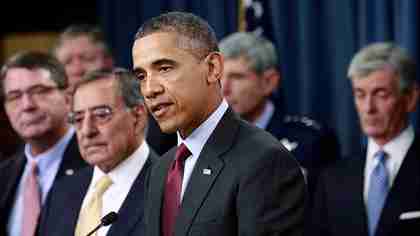 |
President Barack Obama on Thursday announced $490 billion in defense budget cuts over the next decade. The current plan calls for reducing the force in 2015 and 2016 by 27,000 GIs and by as many as 20,000 Marines. The projections were based on the U.S. military leaving Iraq, which occurred at the end of last year, and significantly reducing U.S. forces in Afghanistan by 2014. Panetta may announce deeper reductions. The military services must work more cooperatively to pool their intelligence, surveillance and reconnaissance capabilities and cyber-security tools, as well as operational concepts. The U.S. should be able to deter any emerging anti-access capabilities such as the diesel attack submarines being developed by China and the anti-ship ballistic missiles deployed by China and Iran, and if necessary, defeat them. Bloomberg
The European Union has agreed in principle to slap an oil embargo on Iran, with plans for it to take effect on January 30. However, since Greece, Italy and Spain are heavily reliant on Iranian oil, there may be delays in imposing the embargo. China, which is Iran's largest oil buyer, stands to benefit from the oil embargo. China has cut in purchases of oil from Iran by more than half, and is seeking deep discounts from Iran to continue doing business with Iran in defiance of Western sanctions. Japan and Turkey are expected seek waivers from the Obama administration to buy Iran's oil. If the embargo actually occurs, then it will be the first sanction that will really negatively affect Iran's economy. Spiegel and Reuters
Thousands of American troops, warships and weaponry are arriving in Israel for a joint military drill called "Austere Challenge 12." It will be the largest ever joint drill by the two countries, and is expected to begin in the next few weeks. The drill will test multiple Israeli and U.S. air defense systems against incoming missiles and rockets, presumably from Iran or Iran's allies. The drill was scheduled long ago, and is unrelated to Iran's recent 10-day naval exercise in the Strait of Hormuz. AP
Although the U.S. and Israeli are calling the their plans a "joint military drill," it's actually preparation for a massive military campaign against Iran. Press TV (Iran)
European shares and the euro are heavily undermined by deep-rooted concerns about a possible default by Greece, debt failures by Italy and Spain, and expected credit downgrades of AAA rated eurozone economies, including France. Greece's next drop-dead date is March, when they'll need an additional €14.5 billion bailout payment. Greece has already threatened to leave the eurozone if they don't get a deal, or if more austerity measures are demanded. During 2012, Italy needs to refinance €330 billion, France €282 billion and Germany €219 billion in debt repayments. European banks are coming under strong pressure, because they have large holdings of Greek and Italian bonds that are going toxic. The euro currency weakened against the dollar and the yen. Reuters
According to news reports, Pakistan's and Afghanistan's Taliban have pledged to focus on fighting American and Nato forces inside Afghanistan, and stop killing civilians in either country. Taliban leader Mullah Omar has expressed his dissatisfaction with the suicide bombs, kidnappings for ransom and other criminal acts perpetrated inside Pakistan. Thousands of Pakistanis as well as Afghan civilians have so far died in such attacks, mainly suicide bombings. Pakistan’s economy has also been a major casualty of their aggression. Pakistan's participation as an ally in the US-led War on Terror has exposed it to internal instability, economic ruin and weakened defences on the western border as well as eastern. The Nation (Pakistan)
(Comments: For reader comments, questions and discussion,
see the 6-Jan-12 World View -- U.S. and Israel to stage largest ever joint military drill
thread of the Generational Dynamics forum. Comments may be
posted anonymously.)
(6-Jan-2012)
Permanent Link
Receive daily World View columns by e-mail
Donate to Generational Dynamics via PayPal
Israelis shocked by ultra-Orthodox children dressed as Nazi Holocaust victims
This morning's key headlines from GenerationalDynamics.com.
 |
Tensions between ultra-Orthodox and less observant Jews in Israel continue to heat up. Gender-segregated bus lines and signs urging women to avoid places where men congregate or walk have been around for several years in the ultra-Orthodox area of Beit Shemesh in Israel. But the issue has been gaining widespread attention since an incident last month when zealots seeking gender separation spat at a schoolgirl they accused of dressing immodestly. Israelis were particularly outraged by weekend pictures of children of ultra-Orthodox Jews dressing up as Nazi concentration camp inmates. One child mimicked an iconic photo of a terrified Jewish boy in the Warsaw Ghetto. Thousands of ultra-Orthodox Jews gathered Saturday night in Jerusalem to protest what they say is a nationwide campaign directed against their lifestyle. The protesters called Israeli policemen Nazis, wore yellow Star of David patches with the word "Jude" — German for Jew — dressed their children in striped black-and-white uniforms associated with Nazi concentration camps and transported them in the back of a truck. AP and Reuters and Haaretz
Opposition activists in Syria have accused the regime of Bashar al-Assad of deceiving Arab League monitors. According to the accusations, the regime is hiding tanks and weapons and snipers temporarily when monitor visits are schedule, and is hiding hundreds of detainees in military installations, which the monitors are not permitted to visit. BBC
 |
Formerly, Taiwan was the main point of potential military conflict between China and the U.S. But now, China's claims to vast regions in the South China Sea and East China Sea are seen as more likely to cause military conflict, as neighbors protest China's claims. China has built dozens of submarines armed with antiship cruise missiles, to prevent U.S. aircraft carriers from operating in the disputed waters. Furthermore, the new DF-21D was built to strike a moving ship up to about 1,700 miles away. U.S. defense analysts say the missile is designed to come in at an angle too high for U.S. defenses against sea-skimming cruise missiles and too low for defenses against other ballistic missiles. China's new weapons will prevent U.S. aircraft carriers from fulfilling its defense obligations to Japan and the Philippines. The U.S. is countering by developing pilotless, long-range drone aircraft that can take off from aircraft carriers and combat China's ship without endangering American pilots. Wall Street Journal (Access)
A secret report by India's intelligence service has confirmed India's worst fears: that China is planning a military base in Pakistan, in the tribal areas or the North. In addition, China wants to counterbalance Indian naval forces by having a naval base in Gwadar. "China's deepening strategic penetration of Pakistan and joint plans to set up oil pipelines/ rail/ roads and naval and military bases are a matter of concern," the report says. One of China's concerns is countering Uighur Islamist militants operating from such areas for terrorist activities in Xinjiang. India Today
In the first meeting of Philip Hammond and Leon Panetta, the defense secretaries of the U.K. and the U.S., respectively, the two are expected to announce that they will scale down their military capabilities. According to Hammond:
"Without strong economies and stable public finances it is impossible to build and sustain, in the long-term, the military capability required to project power and maintain defense. That is why today the debt crisis should be considered the greatest strategic threat to the future security of our nations. The fact is, in this era of austerity … not even the United States can afford the astronomical resource commitment required to deal with every threat from every source."
On Thursday, Panetta is expected to announce the results of a Pentagon strategic review, recommending that the US abandon its traditional goal of being able to fight, and win, two wars at the same time. The Pentagon has been asked for cuts of $400 billion. Guardian
Tommy Vietor, the spokesman for the National Security Council, has officially denied, on behalf of the administration, that President Obama has been to Mars. "Only if you count watching Marvin the Martian," he said. He was responding to claims by two former Dept. of Defense researchers that Obama was part of a secret 1980s CIA project to explore Mars. Wired
(Comments: For reader comments, questions and discussion,
see the 5-Jan-12 World View -- China's aggressive military buildup forces U.S. change of strategy
thread of the Generational Dynamics forum. Comments may be
posted anonymously.)
(5-Jan-2012)
Permanent Link
Receive daily World View columns by e-mail
Donate to Generational Dynamics via PayPal
Gunfights between rival militias erupt in Tripoli, Libya
This morning's key headlines from GenerationalDynamics.com.
 |
Israel's Defense Minister Ehud Barak says the regime of Syrian president Bashar al-Assad only has 'a few weeks' before it loses control:
"The Assad family has no more than a few weeks to remain in control in Syria. There is no possibility in the current situation of evaluating what will happen the day after Bashar's fall."
Barak warned that the fall of Assad could have implications for the Israeli-occupied Golan Heights. "In the north, there may be possible implications from Syria on the Golan Heights and a broader area as the result of the loss of control." Syrian opposition leaders have said that Israel will "likely remain an enemy" in the eyes of any government they head. Israel National News
Palestinian negotiator Saeb Erekat and Israel's envoy Yitzhak Molcho met for over three hours in Amman, Jordan, in a meeting mediated by Jordan's Foreign Minister Nasser Judeh. Judeh later said that the meeting had been "positive," but it was pretty clear that nothing had happened. Apparently each side presented its arguments, supported by documents, while the other side listened. These were the first face to face meetings in over 15 months. The Palestinians have set a January 26 deadline for talks to resume under two preconditions: A halt to building new settlements in the West Bank, and an agreement to begin border negotiations starting from the pre-1967 borders. Neither of these preconditions have any chance of being met. On January 26, after the Amman diversion has ended, the Palestinians plan to return to a diplomatic initiative, including trying again for United Nations recognition of a Palestinian state, and charging Israel in the U.N. criminal court with war crimes. Haaretz
It has been calculated the world’s top economies have €5.8 trillion worth of borrowings they will have to pay back in 2012. Japan in the top spot with €2.3 trillion, followed by the United States with the equivalent of €2.1 trillion. Italy needs to refinance €330 billion, France €282 billion and Germany €219 billion. All of these countries will have to borrow even more money to make these 2012 payments -- and most of them will have to pay higher rates of interest, sometimes much higher. Meanwhile, the hope that the credit bubble that burst in 2007 will reflate itself has all but vanished, and there's no sign of anywhere near enough economic growth to even make a dent in these debt figures. I heard an analyst on CNBC on Tuesday morning saying that the European debt crisis is over, and things will be back to normal this year. Where the hell do they get these guys? Euro News
Greece apparently didn't get the memo that the euro crisis is over. Greece was promised a second emergency bailout worth €130bn in October after it became clear that the first rescue package, agreed in May 2010, was not enough to stabilize its debts. Negotiations on the second bailout were supposed to be completed long ago, but they weren't. At issue is the "voluntary haircut" that private investors will take. At first it was 21%, then it became 50%, and now it's clear that 50% won't be enough, but negotiations are stalled on the percentage. The deal has to be completed by March, when Greece will need a €14.5 billion bailout payment to avoid bankruptcy. According to a spokesman for the Greek government, "This famous loan agreement must be signed, otherwise we are outside the markets, out of the euro and things will become much worse." European officials are reportedly going to request more austerity measures, but the spokesman added that imposing more austerity measures and tax increases on the Greek economy will be a problem. "We will see what the shortfall is and it is very likely that measures will be required. I also don't believe it is easy to impose new taxes, but what does cutting spending mean? To close down the public sector? There is no easy solution." Guardian
While most of Europe's economies continue to suffer, Germany's economy is surging. Unemployment in November fell to 6.8%, the lowest rate since East and West Germany were reunified in 1991, with another 22,000 manufacturing jobs created in December. Employment has been boosted by strong exports of manufactured goods to China, as well as strong exports of German cars. BBC
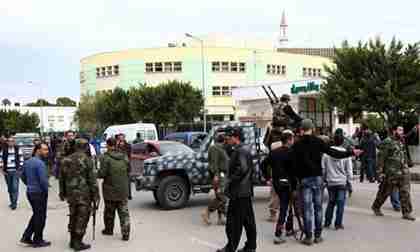 |
A gunfight erupted in Tripoli, Libya, on Tuesday, between two competing militias that had been allied to overthrow Muammar Gaddafi. A group of men from Libya's third-biggest city of Misrata traded anti-aircraft and heavy machinegun fire with a militia from a central Tripoli neighbourhood in broad daylight, resulting in four deaths. The incident has raised concerns of further outbreaks of violence between competing militias as there are large numbers of unsecured weapons around, and because the interim Libyan government has done little to provide security in Tripoli. AFP
The U.S. has tens of thousands of vehicles in Afghanistan, and at least twice as many sea containers holding anything from weapons systems to communications gear. That's just a small portion of the $30 billion worth of equipment that has to be withdrawn from Afghanistan, now that the Nato troops are leaving. "We have had 10 years of bringing things in, with none of it leaving," said one official. The problem is much worse than withdrawing from Iraq for several reasons -- mainly that many Asian countries don't want the Americans to leave and are refusing to cooperate, because the Nato forces are suppressing Islamic militants and controlling drugs and other illicit goods. Guardian
(Comments: For reader comments, questions and discussion,
see the 4-Jan-12 World View -- Europe: Another year older and deeper in debt
thread of the Generational Dynamics forum. Comments may be
posted anonymously.)
(4-Jan-2012)
Permanent Link
Receive daily World View columns by e-mail
Donate to Generational Dynamics via PayPal
Defense authorization bill cuts anti-terror funding to Pakistan
This morning's key headlines from GenerationalDynamics.com.
 |
Iran successfully test-fired a new domestically manufactured coast-to-sea long-range missile, named the Qader ("Capable"), on Monday. The Qader cruise missile has a range of 200 kilometers and flies at a low altitude. It has a high destruction power and can target destroyers and battleships. Short-range Nasr ("Victory") and surface-to-surface Nour ("Light") missiles were also tested, as well as a medium-range Mehrab ("Altar") missile. The Mehrab missile is equipped with anti-radar and anti-jamming systems, and if the enemy tries to jam the guidance system of the missile, it immediately identifies the source of the interference and changes its course toward the source and destroys the jammer. These tests come in the final phase of 10-day naval war games. Tehran Times
An opinion column in the UAE-based Gulf News says that it's time for Gulf Cooperation Council (GCC) to react to "open Iranian threats":
"How much longer are Gulf states going to remain in a state of denial? It may be a bitter pill to swallow but we cannot go on pretending that the Islamic Republic of Iran has friendly intentions when it is becoming increasingly hostile to its Arab neighbours. Now is the time for the GCC to shore up its common defence capabilities and engage with its allies to guard the sovereignty and security of its member countries. ...As if it wasn't bad enough that Tehran has been inciting the Shiite minority in Bahrain to launch violent anti-government protests, in recent days it has been showing off its military muscle in the Strait of Hormuz and the Gulf of Aden during an exercise ominously dubbed "Velayat" — a Farsi word that means "supremacy". If this isn't a clear message to the world and the region, I don't know what is.
Some may be tempted to believe that our ally the US will protect us against Iranian aggression; that may be true but it isn't something we can rely upon. ... They could sell us out any time which is why with the help of God we must take control of our own destiny.
Compounding an already volatile climate was an Iranian threat to close the Strait of Hormuz to shipping in the event Washington imposes sanctions against Iran's oil industry exports. Once again, [Iran] didn't hold back. He said his country has "comprehensive control over the strategic waterway" — the conduit for 15 million barrels of oil daily. Sealing it to vessels would be a "very easy" task for Iranian forces, he somewhat arrogantly believes."
The writer concludes by urging the UAE to cut diplomatic relations with Iran, and ban all trade with Iran. Gulf News
Tehran continues to deny that it is attempting to build nuclear weapons, insisting their program is for generating electricity alone. On Sunday, Iranian state television announced a breakthrough in their nuclear progress, reporting the country had produced uranium fuel rods for power plant use for the first time. This came a day after President Barack Obama approved new sanctions against Iran. These mutual threats make the possibility of a miscalculation that leads to war an increasing possibility. Spiegel
I'll summarize a Generational Dynamics analysis that I've posted many times in the last six years. Iran is in a generational awakening era, just one generation past the Great Islamic Revolution of 1979 and the Iran/Iraq war that climaxed in 1988. That war united the country behind hardline Islamic leaders. But today there's a "generation gap" between that generation and the generation of kids who grew up after the war, and they are rebelling against the hardline Islamic rules being imposed by Supreme Leader Ayatollah Ali Khamenei. This resulted in big political split with huge 2009 protests (like the huge protests in 1967-68 during America's last awakening era in the 1960s). Khamenei's harsh strategy is to provoke Western threats and even a military strike, in order to reunite the country again, as in 1979, though he doesn't understand that generational theory predicts that outcome is impossible. Khamenei's harsh strategy has caused the generation gap to split the government, with open political warfare between Khamenei and president Mahmoud Ahmadinejad. At some point, the split will result in a collapse of the hardline regime (like the resignation of Richard Nixon in 1974). In the end, when Iran is forced to choose, Iran will be on the side of the West in the coming Clash of Civilizations world war.
President Barack Obama signed the National Defense Authorization Act (NDAA) that authorizes $662 billion in funding for the military. The bill contains a provision that authorizes indefinite military detention without trial of American citizens in some circumstances. In signing the bill, Obama added a "signing statement" indicating that he would not permit this provision to be enforced. UPI
Calling it a "historic assault on American liberty," Democrat and George Washington University Law professor Jonathan Turley harshly criticized President Obama's signing of the NDAA as "a continuation of the dishonest treatment of the issue by the White House." He also complained of the "almost complete failure of the mainstream media to cover this issue is shocking. Many reporters have bought into the spin of the Obama administration as they did the spin over torture by the Bush administration." Guardian
From the point of view of Generation Dynamics, this kind of authorization was expected. The NDAA is hardly a "historic assault on America liberty," as claimed by Turley, because even harsher provisions were enacted during the Civil War and World War II. People who worry about a "slippery slope" should take note of the fact that these earlier provisions were repealed once the war ended. We're now entering a new generational crisis era, and there will be a new war. The indefinite detention provisions will, once again, be repealed when the war ends. By the way, this is one more example that when you put aside the rhetoric, the outcomes in the Obama administration are the same as if President Bush had had a third term. Great events are determined by generations of people, not by politicians.
Another NDAA provision, dubbed "a new year gift to Pakistan," could suspend a large chunk of the $1.1 billion military aid to Pakistan. There seems to be a bilateral consensus in the US Congress over the provision that seeks to suspend up to $850 million from the Pakistan Counter-Insurgency Fund. The fund, however, can be released if Secretaries of State and Defence report to Congress that Pakistan is making progress in the war on terror and is cooperating with the US in curtailing the use of improvised explosive devices in Afghanistan. Dawn (Pakistan)
The Iowa caucuses are today, and people occasionally ask me who, among the current crop of prominent politicians, would be the best choice for the next President. Keeping in mind that I'm neither a Democrat nor a Republican, and that my main concern is the best choice to lead the nation through the coming financial and war crises, here are my comments, for what they're worth.
Barack Obama is willing to screw anyone in sight, forget any promise, and violate the constitution or any law to get done anything he wants done, and most of his policies come from his generation's vitriolic hatred of Boomers. However, those may be the best traits to lead the nation, since he'll certainly transform his hatred for Boomers into hatred for the enemy, and will pursue the war ruthlessly and with rabid fury, which is a good thing.
Hillary Clinton has been a good Secretary of State, and she knows a lot more about what's going on in the world than Obama does. She also has the advantage of having her violent serial rapist husband as a partner, who will certainly be an asset to her. Once again, the ruthlessness and desire for vengeance may be an asset in a time of total war.
I feel an affinity to Newt Gingrich because he also makes statements that are obviously true, but politically incorrect. I remember when he said something like, "We're not going to deport millions of illegal aliens who have been here for 10-20 years, and have established lives here." That's certainly true, no matter what you think of the illegal immigrant debate, but saying something truthful does not get you votes these days.
Ron Paul is a total fruitcake.
Mitt Romney and Jon Huntsman both seem to be good solid managers, which should be a good thing when leading the nation into war. Of the two, I would give a preference to Huntsman because he's a true expert on China, and I believe that he's aware that we're headed to war with China, and would be more likely to prepare.
I don't really have solid feelings about the other candidates. The most vomit-worthy moment of the campaign so far was when Herman Cain had no idea what to say about Libya, even though we've been involved in a war there for a year. I'm really glad he's gone.
On a separate subject, the mainstream media stories are focusing on the circus atmosphere of the Iowa elections, and particularly the fact that one candidate after another goes from the bottom of the polls to the top of the polls, and back down again, so that there's been a different poll leader every week.
I would relate this "political volatility" to the volatility in the stock market, and even to the volatility in euroland. People are anxious and desperate, grasping at each new solution, and then abandoning it when they realize that it won't work. At some point, total panic will set in, with unpredictable results.
(Comments: For reader comments, questions and discussion,
see the 3-Jan-12 World View -- Iran plays with fire, provoking a Western military response
thread of the Generational Dynamics forum. Comments may be
posted anonymously.)
(3-Jan-2012)
Permanent Link
Receive daily World View columns by e-mail
Donate to Generational Dynamics via PayPal
No birthday party for 10th anniversary of euro currency
This morning's key headlines from GenerationalDynamics.com.
 |
No one is celebrating on the tenth anniversary of the euro currency, since there's widespread uncertainty whether there will be an eleventh anniversary. The euro currency was supposed to bring integration, stability and prosperity to Europe, but now it seems to be tearing Europe apart, as nations plummet into debt and austerity. Italy will need to raise €450 this year, and Greece will need a new €14.5 billion bond payment by March. Everyone is praying that if they can kick the can down the road enough times, then somehow the credit bubble of a few years ago will start reflating. But Generational Dynamics predicts that nothing of the sort will happen, as the current generations of people continue to save and cut back spending, both personally and in their businesses. One thing that I learned on CNN today is that the bridges and buildings pictured on the euro notes don't actually exist anywhere. Nonexistent structures were created so that no one would offended. Reuters
The Arab Parliament, an Arab League advisory body, has called for the Arab League observer mission to Syria to end, because the violence in Syria is continuing unabated, almost right in front of the observers, making them look like fools, as the UK-based Syrian Observatory for Human Rights said scores of civilians were killed by the security forces of Syrian president Bashar al-Assad in the past few days, with the observers present. According to a statement by Arab Parliament Speaker Ali al-Salem al-Deqbasi:
"The Syrian regime’s continuous abuse and killing of innocent civilians in violation of the agreed upon Arab protocol that meant to protect Syrian people. For this to happen in the presence of Arab monitors has roused the anger of Arab people and negates the purpose of sending a fact-finding mission. This is giving the Syrian regime an Arab cover for continuing its inhumane actions under the eyes and ears of the Arab League."
All this comes after a comic dispute that we reported yesterday. A youtube video clearly and unambiguously shows one of the Arab League monitors saying that he saw Syrian regime snipers on building rooftops, but the leader of the mission, Sudan's General Mohammed Ahmed al-Dabi, said that the monitor's statement was hypothetical, which it clearly was not. Al-Dabi is suspected of being pro-Assad because of his own previous involvement in Sudan's genocide. Kuna (Kuwait)
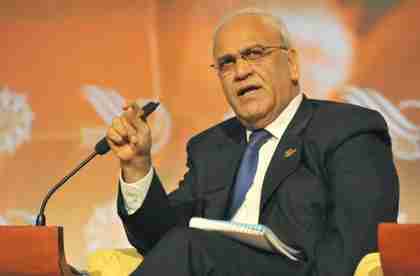 |
Jordan's government announced on Sunday that Israeli and Palestinian negotiators will meet in Jordan's capital, Amman, on Tuesday for direct talks, for the first time in more than a year. US Secretary of State Hillary Clinton on Sunday welcomed the announcement, saying, "it is essential that both sides take advantage of this opportunity." However, a senior figure in the Palestinian Authority said that "this is not a resumption of negotiations." Palestinian chief negotiator Saed Erekat said that the meeting would be "part of ongoing Jordanian efforts to compel Israel to comply with its international legal obligations ... specifically its obligation to freeze all settlement construction". Jerusalem Post
Agreeing to talk (but not negotiate) with Israelis on Tuesday "will be the start of an unprecedented diplomatic campaign on the part of the Palestinian leadership, and it will be a year of pressure on Israel that will put it under a real international siege. The campaign will be similar to the one waged against apartheid in South Africa," according to Palestinian official Nabil Sha'ath.
According to information that has reached Israel, the Palestinians are considering several steps as part of their campaign:
The diplomatic campaign is expected to begin January 26. Haaretz
 |
Europeans may be tightening their belts, but apparently Chinese shoppers have plenty of money to spend. On December 26, high-end British department store Selfridges on Oxford Street in London held an after Christmas sale. Waves of Chinese shoppers came in, buying Lancome cosmetics, Gucci and Prada handbags, and Louis Vutton belts. China Hush (blog)
(Comments: For reader comments, questions and discussion,
see the 2-Jan-12 World View -- Palestinians plan to put Israel under 'international siege'
thread of the Generational Dynamics forum. Comments may be
posted anonymously.)
(2-Jan-2012)
Permanent Link
Receive daily World View columns by e-mail
Donate to Generational Dynamics via PayPal
Iran delays long-range missile tests in Persian Gulf
This morning's key headlines from GenerationalDynamics.com.
 |
The first places to celebrate the arrival of 2012 were the two South Pacific nations of Samoa and Tokelan, the two countries that skipped a day yesterday when the international date line moved. BBC
1942 was the first full year of World War II. Here are the top ten stories of the year.
To this list we should add the assassination of Admiral Darlan for its political significance in the war. St. Petersburg Times, Dec 27, 1942
On the eighth day of its war games in Persian Gulf, Iran's navy announced that it's postponing its long-range missile tests, even though Iran's state media initially reported early Saturday that the long-range missles had already been launched. Deputy Navy Commander Mahmoud Moussavi later went on the English language Press TV channel to deny the missiles had in fact been fired: "The exercise of launching missiles will be carried out in the coming days." Analysts are saying that the conflicting reports on the missile tests were a "shrewd" move to make the West think twice about pressuring Iran on nuclear development. However, it sounds to me that there's a much more obvious explanation -- Iran's navy screwed up and something went wrong. Reuters
Nigerian president Goodluck Jonathan has vowed to crush the Islamist terror group Boko Haram, and has declared a state of emergency in areas hard hit by violence blamed the group. The move came following a series of Christmas Day attacks in northeastern Nigeria, including four that killed about 40 people, most of them Christians. International borders with Cameroon and Chad have been closed, as well as internal borders where violence has been the greatest. The declaration comes as Northern Christian leaders warned that unless the Federal Government moves swiftly to apprehend the perpetrators of the dastardly attack, Nigeria could drift to another civil war. The northern Christian community also called on all concerned Nigerians, no matter their faith, to collaborate with them and the government to return peace and unity in the country. VOA and The Sun (Nigeria)
A dispute has arisen within the the Arab League team monitoring the violence in Syria. A youtube video shows a woman complaining to one of the Arab League monitors that she can't go to the store to get bread, because rooftop snipers are killing people on the street. In the video, the monitor says, "You're telling me there are snipers? You don't have to tell me, I saw them with my own eyes." He says the observers' concerns would be conveyed to the Arab League, and that if the snipers were not removed within 24 hours, action would be taken. However, the leader of the Arab League mission, Sudan's General Mohammed Ahmed al-Dabi, contradicted the account, saying that the monitor's account was hypothetical. Al-Dabi's statement will add to protesters' allegations that he is biased toward Syria, since he was part of the genocide conducted by Sudan in past years. BBC
The plan had been that Yemen's President Ali Abdullah Saleh would come to the United States for medical treatment for injuries incurred from a bomb in his palace mosque in July, and that he would leave his son and nephew in charge of the country. But public unrest is increasing, and Saleh's regime appears to be deteriorating, and so Saleh has reversed his decision to leave. On several occasions since the Arab Spring protests began in Yemen, Saleh has agreed to step down, only to reverse his decision quickly. Apparently he's done it again. AP
Hundreds of Egyptians held protests Saturday outside a Cairo courthouse and in the port city of Alexandria to demand answers over who was behind the terrorist bombing outside Two Saints Church in Alexandria a year ago, killing 21 worshipers. The attack in Alexandria took place Jan. 1, 2011, striking worshipers leaving a New Year’s Eve Mass. A year later, no suspects are in custody. AP
Angry Kurds on Saturday assaulted a local Turkish government official who sought to offer condolences in a village in Turkey where 35 civilians were mistakenly killed in a military airstrike meant to target PKK terrorists, as we reported two days ago. The televised spectacle of men throwing punches and stones at Naif Yavuz, a district governor, was the latest eruption of fury over Wednesday's airstrikes, and it highlighted the deep gulf of trust between the Turkish state and large segments of its ethnic Kurd minority. AP
(Comments: For reader comments, questions and discussion,
see the 1-Jan-12 World View -- Top Ten Stories of the Year - 1942
thread of the Generational Dynamics forum. Comments may be
posted anonymously.)
(1-Jan-2012)
Permanent Link
Receive daily World View columns by e-mail
Donate to Generational Dynamics via PayPal
Web Log Summary - 2016
Web Log Summary - 2015
Web Log Summary - 2014
Web Log Summary - 2013
Web Log Summary - 2012
Web Log Summary - 2011
Web Log Summary - 2010
Web Log Summary - 2009
Web Log Summary - 2008
Web Log Summary - 2007
Web Log Summary - 2006
Web Log Summary - 2005
Web Log Summary - 2004
Web Log - December, 2016
Web Log - November, 2016
Web Log - October, 2016
Web Log - September, 2016
Web Log - August, 2016
Web Log - July, 2016
Web Log - June, 2016
Web Log - May, 2016
Web Log - April, 2016
Web Log - March, 2016
Web Log - February, 2016
Web Log - January, 2016
Web Log - December, 2015
Web Log - November, 2015
Web Log - October, 2015
Web Log - September, 2015
Web Log - August, 2015
Web Log - July, 2015
Web Log - June, 2015
Web Log - May, 2015
Web Log - April, 2015
Web Log - March, 2015
Web Log - February, 2015
Web Log - January, 2015
Web Log - December, 2014
Web Log - November, 2014
Web Log - October, 2014
Web Log - September, 2014
Web Log - August, 2014
Web Log - July, 2014
Web Log - June, 2014
Web Log - May, 2014
Web Log - April, 2014
Web Log - March, 2014
Web Log - February, 2014
Web Log - January, 2014
Web Log - December, 2013
Web Log - November, 2013
Web Log - October, 2013
Web Log - September, 2013
Web Log - August, 2013
Web Log - July, 2013
Web Log - June, 2013
Web Log - May, 2013
Web Log - April, 2013
Web Log - March, 2013
Web Log - February, 2013
Web Log - January, 2013
Web Log - December, 2012
Web Log - November, 2012
Web Log - October, 2012
Web Log - September, 2012
Web Log - August, 2012
Web Log - July, 2012
Web Log - June, 2012
Web Log - May, 2012
Web Log - April, 2012
Web Log - March, 2012
Web Log - February, 2012
Web Log - January, 2012
Web Log - December, 2011
Web Log - November, 2011
Web Log - October, 2011
Web Log - September, 2011
Web Log - August, 2011
Web Log - July, 2011
Web Log - June, 2011
Web Log - May, 2011
Web Log - April, 2011
Web Log - March, 2011
Web Log - February, 2011
Web Log - January, 2011
Web Log - December, 2010
Web Log - November, 2010
Web Log - October, 2010
Web Log - September, 2010
Web Log - August, 2010
Web Log - July, 2010
Web Log - June, 2010
Web Log - May, 2010
Web Log - April, 2010
Web Log - March, 2010
Web Log - February, 2010
Web Log - January, 2010
Web Log - December, 2009
Web Log - November, 2009
Web Log - October, 2009
Web Log - September, 2009
Web Log - August, 2009
Web Log - July, 2009
Web Log - June, 2009
Web Log - May, 2009
Web Log - April, 2009
Web Log - March, 2009
Web Log - February, 2009
Web Log - January, 2009
Web Log - December, 2008
Web Log - November, 2008
Web Log - October, 2008
Web Log - September, 2008
Web Log - August, 2008
Web Log - July, 2008
Web Log - June, 2008
Web Log - May, 2008
Web Log - April, 2008
Web Log - March, 2008
Web Log - February, 2008
Web Log - January, 2008
Web Log - December, 2007
Web Log - November, 2007
Web Log - October, 2007
Web Log - September, 2007
Web Log - August, 2007
Web Log - July, 2007
Web Log - June, 2007
Web Log - May, 2007
Web Log - April, 2007
Web Log - March, 2007
Web Log - February, 2007
Web Log - January, 2007
Web Log - December, 2006
Web Log - November, 2006
Web Log - October, 2006
Web Log - September, 2006
Web Log - August, 2006
Web Log - July, 2006
Web Log - June, 2006
Web Log - May, 2006
Web Log - April, 2006
Web Log - March, 2006
Web Log - February, 2006
Web Log - January, 2006
Web Log - December, 2005
Web Log - November, 2005
Web Log - October, 2005
Web Log - September, 2005
Web Log - August, 2005
Web Log - July, 2005
Web Log - June, 2005
Web Log - May, 2005
Web Log - April, 2005
Web Log - March, 2005
Web Log - February, 2005
Web Log - January, 2005
Web Log - December, 2004
Web Log - November, 2004
Web Log - October, 2004
Web Log - September, 2004
Web Log - August, 2004
Web Log - July, 2004
Web Log - June, 2004